

Commerce & Finance
- Palestine: Jerusalem
- Palestine: Masjid al-Aqsa
- Palestine: Other
- Makkah: Hajj places
- Makkah: Masjid al-Haram
- Makkah: Other
- Madinah: Masjid-e-Nabwi
- Madinah: Other
- Saudi Arabia: Additional places
Can non-Muslims go to Mecca or Madina? Can Tourists Enter?
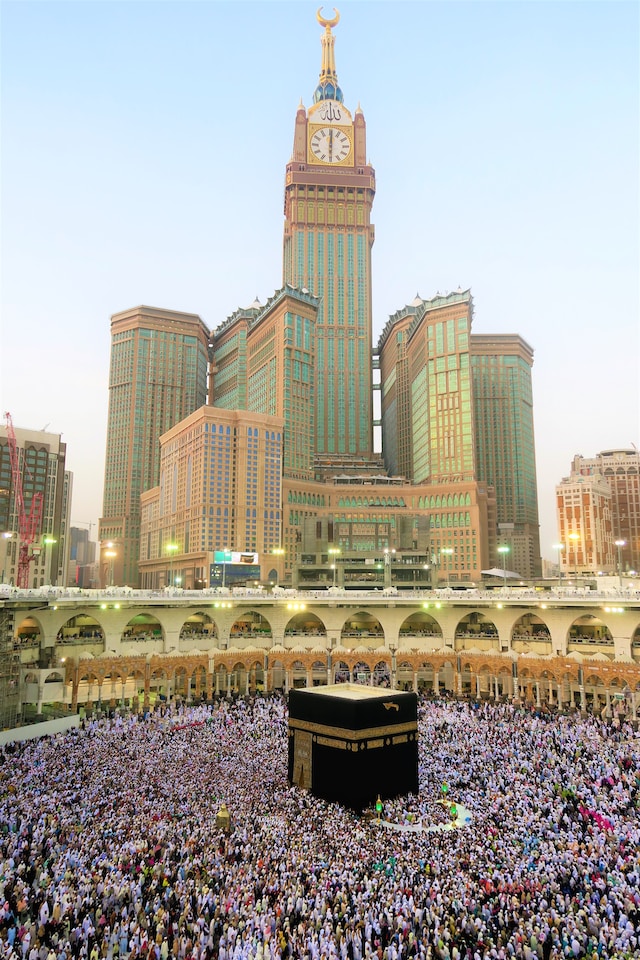
Table of Contents
Mecca and Medina are the two most important cities in the Islamic world, and millions of Muslims from around the world visit these cities each year to perform Hajj or Umrah.
However, non-Muslims are not allowed to enter Mecca, but are allowed to visit Madinah. This raises a lot of questions for people who wish to visit Mecca or Medina, especially for tourists and people of other religions.
Why Are Non-Muslims Not Allowed in Mecca or Madina?
When the question arises, ‘ Can non-Muslims go to Mecca ‘ the answer is No.
Non-Muslims are not allowed to enter the holy cities of Mecca in Saudi Arabia. The reasons for this restriction are deeply rooted in the Islamic faith and history.
Mecca and Medina are considered the holiest cities in Islam and are revered by Muslims worldwide. Mecca is home to the Kaaba, the first house of worship dedicated to the one true God, Allah. It is also the site of the annual Hajj pilgrimage , which is one of the five pillars of Islam and mandatory for every able-bodied Muslim who can afford it.
The Quran, the holy book of Islam, states that Mecca is a sanctuary that is reserved exclusively for Muslims and non-Muslims cannot vsit Mecca.
It says in the Quran,
“O you who have believed, indeed the polytheists are unclean, so let them not approach al-Masjid al-Haram after this, their [final] year” (9:28). This Quran verse is interpreted by Islamic scholars as a commandment to keep non-Muslims out of Mecca.
Furthermore, the Prophet Muhammad (SAW) declared that Mecca and Medina are sacred lands that are not to be polluted by non-Muslims.
“No unbeliever may enter Mecca. No one may circumambulate the Kaaba naked or perform the pilgrimage naked” (Sahih Muslim, 1355).
This restriction on non-Muslims entering Mecca has been in place for centuries and is strictly enforced by the Saudi Arabian government. Non-Muslims who attempt to enter Mecca can face severe consequences, including imprisonment and deportation.
The rationale behind this ban is to preserve the sanctity and purity of Mecca as holy site for Muslims . Allowing non-Muslims to enter Makkah could potentially lead to the desecration of these sacred sites and compromise their spiritual significance for Muslims.
In addition to the religious and cultural reasons, there are also security concerns that justify the ban on non-Muslims entering Mecca. The Saudi Arabian government takes the responsibility of protecting the holy cities and their visitors very seriously. It believes restricting access to these cities is necessary to ensure their safety.
How Do They Check if You Are Muslim in Mecca?
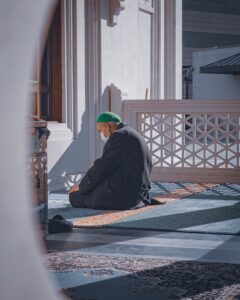
The passport will be checked at the arrival registration counter at airport when arriving in Saudi Arabia, and if the passport has any visa stamps from Israel, it will be deemed invalid.
Additionally, non-Muslims are not allowed to apply for the special Hajj or Umrah visas, which are required to enter Makkah and Medina.
Furthermore, there are checkpoints and barriers set up on the roads leading to Mecca to ensure that only Muslims enter the city.
At these checkpoints, visitors will be asked to show their Hajj or Umrah visas as well as their ID cards, which will indicate their religion.
Additionally, there are officers who will be observing the visitors’ behavior and dress to ensure that they are adhering to Islamic norms and customs.
What if I’m a Tourist Visiting Saudi Arabia?
If you are a non-Muslim tourist visiting Saudi Arabia, you will not be allowed to enter the holy citiy of Makkah. However, you can still visit other parts of the country, such as Madina, Riyadh or Jeddah, and experience the culture and hospitality of the Saudi people.
The government has also started promoting tourism in the country, and there are many tourist attractions that you can visit.
Can a Revert/Converted Muslim Go to Mecca?
Yes, a revert Muslims can of course go to Mecca.
However, it is important to note that the Saudi Arabian government has implemented strict rules and regulations for Hajj and Umrah pilgrims, and you must follow these rules to perform the pilgrimage.
Can a Christian Enter Mecca?
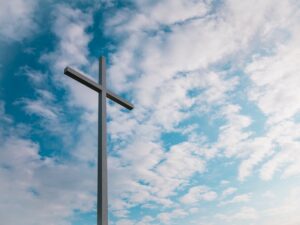
No, Christians are not allowed to enter Mecca. According to Islamic teachings, Christians are considered to be polytheists, and they are not allowed to enter the holy cities.
However, there have been reports of some non-Muslims being allowed to enter the cities for diplomatic or business reasons, but these are rare cases.
Can a Hindu Enter Mecca?
No, Hindus are not allowed to enter Mecca or Medina. Hindus are considered to be idolaters, and according to Islamic teachings, idolaters are not allowed to enter the holy cities.
However, there have been some exceptional cases of Hindus being allowed to enter Mecca for diplomatic or business reasons.
Can a Jew Enter Mecca?
No, Jews are not allowed to enter Mecca. The Saudi Arabian government strictly prohibits non-Muslims from entering the holy city of Mecca, and this includes Jews.
This rule is in place to preserve the sanctity and purity of the holy sites for Muslims and to prevent any potential harm to the religious and cultural identity of the city.
Is There an Age Limit for Hajj?
There is no specific age limit for Hajj, but the pilgrim must be physically and financially capable of performing the journey. However, due to safety concerns, the Saudi government has set the minimum age for performing Hajj at 12 years .
Elderly people and those with underlying health conditions are advised to consult their doctors before embarking on the Hajj journey.
What Happens if a Non-Muslim Enters Mecca?
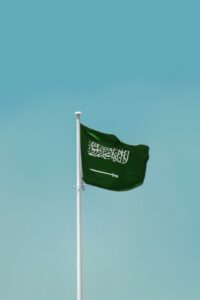
If a Non-Muslim is found entering Mecca, they will be arrested and deported back to their country.
The Saudi government takes the ban on non-Muslims entering Mecca seriously, and violators can face severe punishment, including imprisonment and fines.
Incidents When Non-Muslims Entered Mecca
There have been instances in the past where non-Muslims have entered Mecca. In 1979, a group of armed militants led by Juhayman al-Otaybi took control of the Grand Mosque in Mecca.
The militants were from Saudi Arabia and Yemen, and they believed that the ruling Saudi monarchy had become corrupt and unIslamic.
The Saudi government eventually regained control of the mosque after a two-week siege, during which many people were killed or injured. This incident highlighted the potential security risks that non-Muslims could pose if they were allowed to enter Mecca.
In 2002, an American Jew and TV journalist in Israel named Gil Tamary secretly entered Mecca to record footage for a travelogue.
Despite the strict enforcement of the ban on non-Muslims in Mecca, Tamary managed to gain entry along with only 17 other non-Muslims known to have done so in recent decades.
The incident caused an uproar among Muslims, Israelis, and Westerners alike, as they feared it would increase hostility. The Saudi government pressed criminal charges against Tamary and his Saudi driver.
Tamary later issued an apology and claimed his intention was to highlight the significance of Mecca and the beauty of the religion to promote religious tolerance.
These incidents demonstrate the importance that Muslims place on the sanctity of Mecca and the need for strict measures to prevent non-Muslims from entering the city.
While there may be some curiosity among non-Muslims about what lies inside the holy city, it is important to respect the religious beliefs and practices of others and refrain from attempting to enter Mecca without permission.
Can Non-Muslim Enter Mosques?
Non-Muslims are allowed and welcomed to enter mosques in Saudi Arabia, however the only mosques they are not allowed to enter is Masjid Al Haram and sacred areas around it.
In many Muslim-majority countries, non-Muslims are allowed to enter mosques, although there may be certain restrictions or protocols that they need to follow, such as dress code and behavior. Visitors are often required to remove their shoes and dress modestly, and photography and loud talking may not be allowed.
In some cases, non-Muslims may be allowed to enter mosques but only in certain areas, such as a designated viewing area or the outer courtyard. In other cases, non-Muslims may be allowed to enter the mosque but only during certain times, such as outside of prayer times. But in most cases non Muslims are welcomed to visit mosques.
There are times when some mosques that do not allow non-Muslims to enter at all. This may be because the mosque is considered to be a particularly sensitive or sacred site or because there have been security concerns in the past.
In general, it is recommended that non-Muslims who wish to visit a mosque should be respectful of Islamic customs and traditions. This may include dressing modestly, removing shoes before entering the mosque, and refraining from any behavior that could be seen as disrespectful or disruptive.
Overall, non-Muslims are permitted to enter mosques, unless that mosque is Masjid Al Haram. With proper respect and consideration for Islamic customs and traditions, it is often possible for non-Muslims to visit and appreciate these important cultural and religious sites.
Islam Is Not the Only Religion That Bans/Restricts Access to Holy Sites
It is important to note that Islam is not the only religion that restricts access to certain holy sites. Many religions around the world have similar practices, and it is often done to preserve the sanctity and religious significance of these places.
For example, in Hinduism, non-Hindus are not allowed to enter certain temples.
In addition, there are also many secular restrictions on access to certain areas around the world, such as military zones, national parks, and private property.
Summary – Can Non-Muslims Go to Mecca or Medina?
The bottom line is non-Muslims are generally not allowed to enter Mecca, which are considered the holiest cities in Islam. This is due to the religious significance of these places and the Islamic belief that only Muslims are allowed to enter.
There are strict checkpoints and guidelines in place to ensure that only Muslims are able to enter, and those who attempt to enter without permission may face severe consequences.
However, tourists and visitors to Saudi Arabia are still able to experience the culture and history of the country, and there are many other places to visit and explore.
It is important to be respectful of local customs and traditions and to follow all laws and regulations while visiting the country.
Browse by place

Download our free Ziyarah guides
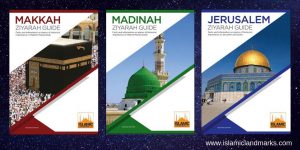
You may also like
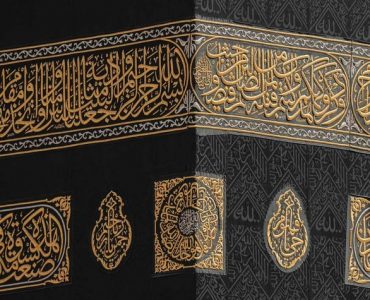
Kiswah (The cover of the Ka’bah)
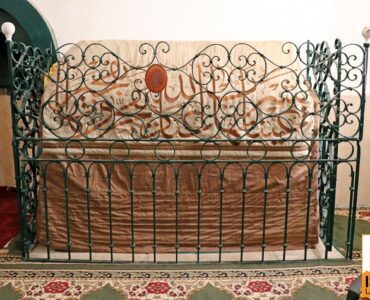
Maqam of Salman Farsi (رضي الله عنه)
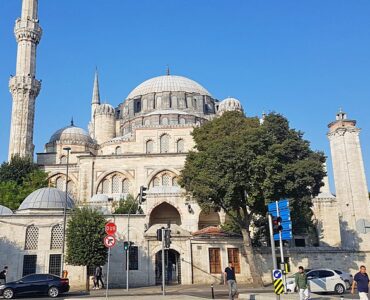
Sehzade (Prince’s) Mosque
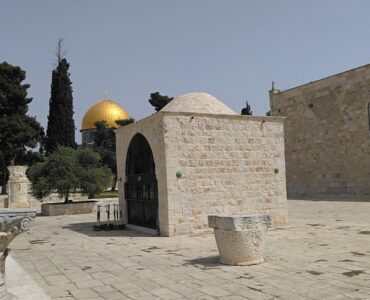
Dome of Yusuf Agha
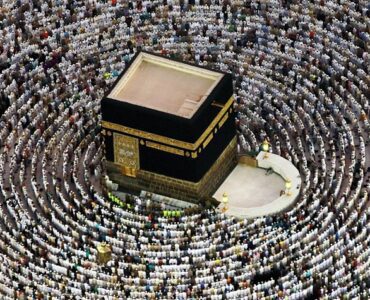
The Ka’bah – The House of Allah
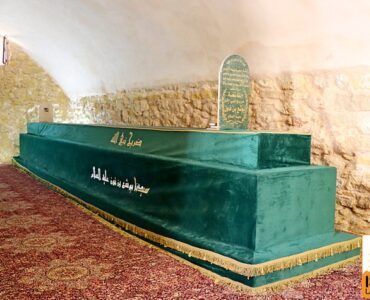
Maqam of Prophet Yusha (عليه السلام)
Find answers to over 300 Hajj and Umrah questions
About this site
Please note that some of the places featured on this site cannot be verified for certain. The knowledge of these places has been passed down through the ages and in some cases more than one location make claim to hosting the same historical place. In such instances IslamicLandmarks.com has shown the most commonly believed site. And Allah (ﷻ) knows best.
Our social media channels
If you've benefitted from this website please consider making a donation . It will help us to expand the site and create more functionality which will insha'Allah benefit many others.
Stay up to date and informed on:

2,614,903 Visitors since 2020

Young Pioneer Tours

Are non-Muslims Banned from Mecca in 2024?
Saudi Arabia has recently opened its doors for tourism. One of the most common questions from travellers is: are tourists who are non-Muslims banned from Mecca, Saudi Arabia’s most famous city?
Mecca receives nearly 9 million visitors each year. Yet, unlike other cities around the world, this city is not open for everyone. Each of these 9 million people is Muslim, for non-Muslims are banned from Mecca under Saudi Arabian Law.
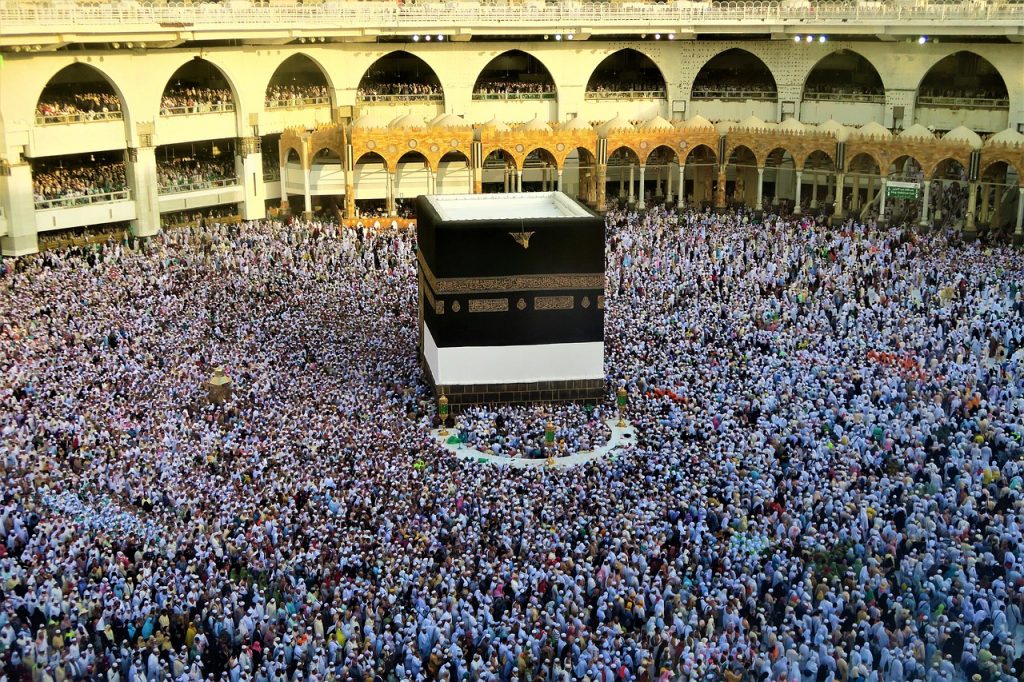
Mecca is the holiest city in all of Islam. It is believed to be the birthplace of God’s revelation to man, and the city is centered around kabba, which is believed to be the site where God first revealed his message to the Prophet Abraham. Every day, more than a billion Muslims pray in the direction of Mecca during the 5 daily prayers that Muslims complete.
Why are Non-Muslims Banned from Mecca?
The issue of banning non-Muslims from Mecca is complicated. Religiously, the Quran’s Surah Al-Tawbah is most commonly cited as the main reason why non-Muslims are banned from Mecca.
The Surah roughly translates to: “O believers! Indeed, the polytheists are spiritually impure, so they should not approach the Sacred Mosque after this year.” In Arabic, the original word for polytheists is Mushirk . Mushirk refers to a person who associates other actors to God.
As Mecca and the kabba is understood to be a place built by the prophet Abraham to declare the first of God’s revelations, the question then becomes whether or not the other “people of the book” who believe in a God’s message as a transmission from the Prophet Abraham should be allowed to enter the haram of Mecca.
Whether or not the other Abrahamic religions are mushirk(polytheist) is also controversial, particularly in regards to trinitarian Christians, and the Quran states at different points that Jews and Christians are both believers and non-believers.
In a historical context, Surah-al Tawbah was written in the 10th year of Hijrah. During this time, the kabba was a site for many polytheistic pilgrimages. It was the center of a lot of shirk (idolism), particularly to the pagan Gods Hubal, Manaf, Isaf and Na’ila. At this point in history, it is generally understood that the banning of mushriks in Mecca refers to the polytheistic worshippers that frequented Mecca in the year 632 (10 Hijrih year).
Different Islamic scholars during the creation of the Islamic Madhabs had differing views on this surah. The scholar Imam Abu Hanifah (Hanafi School) stated that entrance to the Kabba was restricted to prevent pagan hajj (pilgramage) that was common during the jahiliyya (age of ignorance) and Imam Malak (Malaki school) stated that it was only as a result of non-Muslims and mushirks tendency to be in a state of spiritual and physical uncleanliness. Imam Shafi’i (Shafi school) stated that the people of the book should be banned from entering the holy mosque until they found faith in Islam, but he cited an important hadith in which non-Muslim Thumamah ibn Athal declared his faith upon seeing the holy mosque.
In reference to whether or not Christians and Jews should be allowed to enter Mecca and Medina with the exception of the physical grounds of the Holy Mosque, the isnad (chains of transmission) regarding the Prophet’s understanding of this are quite weak, and there is not a clear agreement as to the actually boundaries of restriction.
However, non-Muslims were not officially banned from Mecca until 473 years after the founding of Islam. The law was first instituted under the ruler Noor-ud-Din in 1081 AD. This law was put in place after Pope Sixtus sent two spies on a mission to try to remove the Prophet Mohammad’s body and return it to Rome. This was part of the Pope’s attempt to weaken and discredit Islam during the Crusades.
Overall, the issue is not clear, and depending on different people’s interpretation of Islam, it can be understood in different ways. Some may argue that the Quran forbids non-Muslims from visiting Mecca, while others may see this ban as a political decision that occurred as a result of religious wars and espionage between Christians and Muslims in the Middle Ages.
So Can a non-Muslim Visit Mecca?
While some Muslims might find it ethically-okay for Christians and Jews to view Mecca depending on their state of cleanliness, their beliefs of the oneness of God, or their interest in converting to Islam, it is still illegal to be caught visiting Mecca as a non-Mulsim under Saudi Law.
A recent case, in which an Jewish Israeli journalist snuck into Mecca, resulted in massive outrage and the arrest of his Saudi friend . While this case was linked to much-larger political tensions, it is still risky for everyday tourists to attempt to explore Mecca, as they may be deported or arrested if found.
Non-Muslims typically stand out in Mecca, as the city has a strict code of rituals that non-Muslims struggle to follow. Men must wear an elaborately folded white cloth known as the ihram , and there are very specific and complex rituals, prayers, and Arabic greetings that all Muslims are expected to know and recite in Mecca.
Overall, it is not a good idea to try to visit Mecca as a non-Muslim. It is illegal, and the risk outweighs the reward.
Why are Non-Muslims Banned from Mecca Still?
For many years, it was nearly-impossible to sneak into Mecca as a non-Muslim, as tourism was banned for non-Muslims in Saudi Arabia.
Yet, since 2020, Saudi Arabia has opened its borders for tourists to come explore the country’s rich culture and history. The state has unveiled a massive plan to promote tourism as a centerpoint in the country’s economy, which represents a massive switch in the state’s ideology.
Many travelers wonder if tourists will someday be allowed to enter Mecca as part of this new push towards tourism.
Someday, could non-Muslims visit Mecca? Maybe
Will it be open for non-Muslims to visit Mecca soon? Probably Not
In short, Saudi Arabia has no need or desire to open Mecca to non-Muslim tourists. Visiting Mecca is one of the pillars of Islam, and every Muslim seeks to carry out a pilgrimage to Mecca at least once in their life. With nearly 2 billion Muslims in the world, there is never a shortage of pilgrims.
In fact, many Muslim countries have a strict system for regulating visas for Muslims to travel to Saudi Arabia for pilgrimage at Mecca. Many Muslims wait decades to get a visa to be able to travel to Mecca.
Considering that a pilgrimage to Mecca is one of the most significant dreams for millions of Muslims around the world, it seems both irresponsible and inconsiderate for Saudi Arabia to open Mecca for non-Muslims and reduce the number of places available for devout Muslims.
Can I Visit Any Mosques in Saudi Arabia?
Yes, most mosques in the world are open to non-Muslims. Non-Muslims cannot enter the city of Mecca. However, non-Muslims can enter the city of Medinah, located north of Saudi Arabia. They are only restricted from entering the Prophet’s mosque, where the prophet Mohammaed is buried. Non-Muslims also may be restricted from entering mosques during one of the five daily prayers in Islam.
Otherwise, non-Mulsims are otherwise largely welcome to visit mosques in Saudi Arabia. Some mosques even have learning spaces for non-Muslims to ask questions about Islam and learn more about the country and its religion.
Saudi Arabia is a deeply religious country, and one can still gain a greater understanding and appreciation for the religion and the country by chatting with locals or visiting one of the thousand, less-popular mosques around the country.
About Post Author
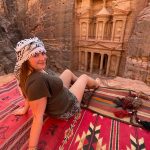
Joelle Bohringer
Joelle’s first Arabic teacher nicknamed her “Ibn Battuta” after the legendary Arab explorer because of her love for exploring new and unusual places. While her travels have spanned cultures and continents, she is an expert on the Arab World, and guides full time for YPT.
See author's posts
- Suspendisse tincidunt nunc nec
Tripadvisor
Latest news.

World Cup dream alive as DPR Korea beat Syria

Thailand extends its visa policies from June 2024

YPT group attends epic Rammstein concert in Belgrade on May 24th 2024

An American in South Korea Heads North (Part 1)
- Terms & Conditions
- Payment Policy
- North Korea Tours – 2017 Tours
- Tour Extensions
- Independent Tours
- North Korea FAQ
- Our Terms and Conditions
- Our Payment Policy Terms
©YoungPioneerTours.com 2024. All rights reserved.
Why Are Only Muslims Allowed to Visit the Holy City of Mecca?
Mecca and Non-Muslim Visitors
Reza / Getty Images
- Hajj and Eid Al Adha
- Important Principles
- Prayer Salat
- Prophets of Islam
- Ramadan and Eid Al Fitr
- M.Ed., Loyola University–Maryland
- B.S., Child Development, Oregon State University
Mecca is a city of terrific importance in Islamic tradition. It is a center of pilgrimage and prayer -- a sacred place where Muslims are free from the distractions of daily life. Only Muslims are allowed to visit the holy city of Mecca and enter its inner sanctum, the birthplace of the Prophet Muhammad and Islam. As the holiest city in the Islamic faith, every Muslim who is of sound health and financially able is required to make the pilgrimage -- or Hajj (one of the Pillars of Islam) -- to Mecca at least once in their lifetime in order to show honor, obedience, and respect to Allah.
Where Is Mecca?
Mecca -- home to the Kaaba, Islam's holiest site, otherwise known as the House of God (Allah) -- is located in a narrow valley in the Hijaz region (so-called because of the geography of its "hijaz," or "backbone," the Sarat Mountains, which consists of volcanic peaks and deep depressions) of Saudi Arabia, about 40 miles inland from the Red Sea coast. Once an oasis and caravan trade route, ancient Mecca linked the Mediterranean with South Asia, East Africa, and South Arabia.
Mecca and the Quran
Non-Muslim visitors are banned in the Quran: "Oh you who believe! Truly the idolaters are unclean; so let them not, after this year, approach the Sacred Mosque. ..." (9:28). This verse specifically refers to the Grand Mosque in Mecca. There are some Islamic scholars who would permit exceptions to this general rule, for trade purposes or for people who are under treaty permission.
Restrictions to Mecca
There is some debate about the exact area and borders of the restricted areas -- several miles around the holy sites are considered haram (restricted) to non-Muslims. Nevertheless, the government of Saudi Arabia -- which controls access to the holy sites -- has decided upon a strict ban to Mecca in its entirety. Restricting access to Mecca is intended to provide a place of peace and refuge for Muslim believers and preserve the sanctity of the holy city. At this time, millions of Muslims visit Mecca each year, and additional tourist traffic would simply add to the congestion and detract from the spirituality of the pilgrimage visit.
- The Stages of Hajj, the Islamic Pilgrimage to Mecca (Makkah)
- The Architecture and History of the Kaaba
- Madinah City Guide
- What happens after one performs Hajj?
- Makkah Visitors Guide
- Why Is the City of Jerusalem Important in Islam?
- Biography of the Prophet Muhammad's Later Life
- Top Islamic Art Museum Collections
- International Flags With a Crescent Moon and Star Symbol
- Ideas for Muslim Baby Boy Names A to Z
- The 5 Prayers of Islam
- When Is the Hajj Held?
- Are Muslims Allowed to Get Tattoos?
- Is Smoking Allowed in Islam?
- Authorized U.S. Travel Agents for Hajj and Umrah Trips
- Islamic Festival Eid al-Adha

- What is a visa?
- Electronic Visa (eVisa)
- Visa on Arrival
- Appointment Required Visa
- Invitation Letter
- Arrival Card
- Passport Renewal
- Project Kosmos: Meet the man with the world's most challenging travel schedule
- Australia Visa and ETA requirements for US citizens explained
- Brazil eVisa for US citizens
- India Tourist Visa for UK citizens
- Possible B1/B2 Visa questions during the interview
Select Your Language
- Nederlandse
- 中文 (Zhōngwén), 汉语, 漢語
Select Your Currency
- AED United Arab Emirates Dirham
- AFN Afghan Afghani
- ALL Albanian Lek
- AMD Armenian Dram
- ANG Netherlands Antillean Guilder
- AOA Angolan Kwanza
- ARS Argentine Peso
- AUD Australian Dollar
- AWG Aruban Florin
- AZN Azerbaijani Manat
- BAM Bosnia-Herzegovina Convertible Mark
- BBD Barbadian Dollar
- BDT Bangladeshi Taka
- BGN Bulgarian Lev
- BIF Burundian Franc
- BMD Bermudan Dollar
- BND Brunei Dollar
- BOB Bolivian Boliviano
- BRL Brazilian Real
- BSD Bahamian Dollar
- BWP Botswanan Pula
- BZD Belize Dollar
- CAD Canadian Dollar
- CDF Congolese Franc
- CHF Swiss Franc
- CLP Chilean Peso
- CNY Chinese Yuan
- COP Colombian Peso
- CRC Costa Rican Colón
- CVE Cape Verdean Escudo
- CZK Czech Republic Koruna
- DJF Djiboutian Franc
- DKK Danish Krone
- DOP Dominican Peso
- DZD Algerian Dinar
- EGP Egyptian Pound
- ETB Ethiopian Birr
- FJD Fijian Dollar
- FKP Falkland Islands Pound
- GBP British Pound Sterling
- GEL Georgian Lari
- GIP Gibraltar Pound
- GMD Gambian Dalasi
- GNF Guinean Franc
- GTQ Guatemalan Quetzal
- GYD Guyanaese Dollar
- HKD Hong Kong Dollar
- HNL Honduran Lempira
- HTG Haitian Gourde
- HUF Hungarian Forint
- IDR Indonesian Rupiah
- ILS Israeli New Sheqel
- INR Indian Rupee
- ISK Icelandic Króna
- JMD Jamaican Dollar
- JPY Japanese Yen
- KES Kenyan Shilling
- KGS Kyrgystani Som
- KHR Cambodian Riel
- KMF Comorian Franc
- KRW South Korean Won
- KYD Cayman Islands Dollar
- KZT Kazakhstani Tenge
- LAK Laotian Kip
- LBP Lebanese Pound
- LKR Sri Lankan Rupee
- LRD Liberian Dollar
- LSL Lesotho Loti
- MAD Moroccan Dirham
- MDL Moldovan Leu
- MGA Malagasy Ariary
- MKD Macedonian Denar
- MNT Mongolian Tugrik
- MOP Macanese Pataca
- MUR Mauritian Rupee
- MVR Maldivian Rufiyaa
- MWK Malawian Kwacha
- MXN Mexican Peso
- MYR Malaysian Ringgit
- MZN Mozambican Metical
- NAD Namibian Dollar
- NGN Nigerian Naira
- NIO Nicaraguan Córdoba
- NOK Norwegian Krone
- NPR Nepalese Rupee
- NZD New Zealand Dollar
- OMR Omani Rial
- PAB Panamanian Balboa
- PEN Peruvian Nuevo Sol
- PGK Papua New Guinean Kina
- PHP Philippine Peso
- PKR Pakistani Rupee
- PLN Polish Zloty
- PYG Paraguayan Guarani
- QAR Qatari Rial
- RON Romanian Leu
- RSD Serbian Dinar
- RUB Russian Ruble
- RWF Rwandan Franc
- SAR Saudi Riyal
- SBD Solomon Islands Dollar
- SCR Seychellois Rupee
- SEK Swedish Krona
- SGD Singapore Dollar
- SHP Saint Helena Pound
- SLL Sierra Leonean Leone
- SOS Somali Shilling
- SRD Surinamese Dollar
- SVC Salvadoran Colón
- SZL Swazi Lilangeni
- THB Thai Baht
- TJS Tajikistani Somoni
- TOP Tongan Pa anga
- TRY Turkish Lira
- TTD Trinidad and Tobago Dollar
- TWD New Taiwan Dollar
- TZS Tanzanian Shilling
- UAH Ukrainian Hryvnia
- UGX Ugandan Shilling
- USD United States Dollar
- UYU Uruguayan Peso
- UZS Uzbekistan Som
- VND Vietnamese Dong
- VUV Vanuatu Vatu
- WST Samoan Tala
- XAF CFA Franc BEAC
- XCD East Caribbean Dollar
- XOF CFA Franc BCEAO
- XPF CFP Franc
- YER Yemeni Rial
- ZAR South African Rand
- ZMW Zambian Kwacha
Apply for and track your visa with our new app!
Download Now
Can you visit Mecca in Saudi Arabia as a tourist?
Mecca, also known as Makkah, located in western Saudi Arabia, is the holiest city in Islam.
More than three million Muslims visit this city during the month of Dhul-Hijjah every year for the Hajj pilgrimage, and many others also make smaller pilgrimages or perform Umrah during other times of the year.
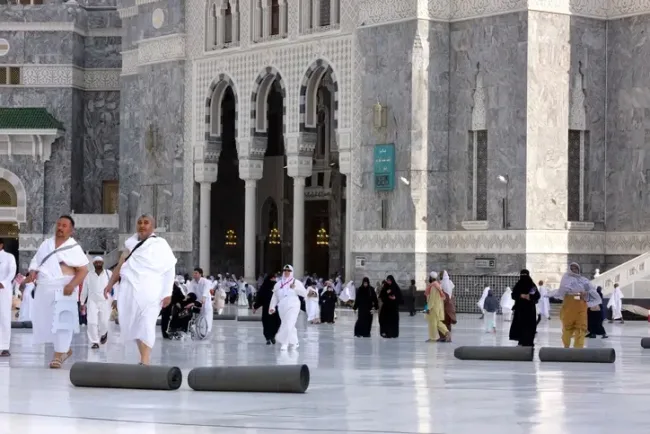
While Mecca is open to tourists, it's important to know that it's limited to Muslim travelers only , and there are other rules and restrictions you must know about before you go. Let's dive in.
Can I travel to Mecca as a tourist?
The simple answer is no, unless you're Muslim .
Non-Muslims are strictly prohibited from entering the holy city of Mecca and certain parts of Medina. Signs indicating these boundaries are clearly signposted, and it's crucial to respect these restrictions.
Rules and restrictions for visiting Mecca as a Muslim tourist
Embarking on a pilgrimage to Mecca, the heart of the Islamic world, is a profoundly spiritual journey that every Muslim aspires to undertake at least once in their lifetime.
Here are the essential rules and restrictions for visiting Mecca as a Muslim tourist , ensuring your spiritual journey is both fulfilling and in complete harmony with the sacred regulations of this holy city:
Pilgrimage eligibility: The pilgrimage to Mecca, known as Hajj, is obligatory for all adult Muslims who are physically and financially capable of undertaking the journey. Additionally, the Umrah, a smaller pilgrimage, can be performed at any time of the year but is not obligatory.
Visa requirements: Pilgrims must obtain a specific visa for Hajj or Umrah from Saudi Arabian embassies or consulates. These visas are issued by Islamic lunar months, with Hajj visas available only during particular periods. Our platform simplifies this process, offering updated information and assistance with your visa application.
Respect for local customs and dress code: Visitors to Mecca are expected to adhere to Islamic principles of conduct and dress modestly. For men, this includes wearing the Ihram during the Hajj, while women should wear clothes that cover the body appropriately and avoid perfume and makeup during the rituals.
Health requirements: Pilgrims must meet certain health criteria to protect themselves and others during their journey. This includes vaccinations, particularly for meningitis, and the Saudi government may require COVID-19 vaccinations. Check the latest info on the government website .
Environmental awareness: The Saudi authorities encourage pilgrims to maintain cleanliness and environmental awareness throughout their journey. Littering or damaging the natural and urban environment of the sacred sites is strictly prohibited.
Safety and security: Given the large crowds, especially during Hajj, it's essential to follow all safety guidelines provided by the authorities. This includes staying with your group, following the designated ritual routes, and securing personal belongings.
Women: Women can register for Hajj without a male guardian if they go in a group with other women.
Photographs: You are not allowed to take photos (still or video, even with your phone) at the Holy Mosque in Mecca or the Prophet's Mosque in Medina. If you break this rule, your device may be taken away.
There may be other rules that you must adhere to, so make sure to stay updated and informed throughout the process of traveling to Mecca.
How does the Saudi government check if you're Muslim to visit Mecca?
Saudi Arabia's government restricts entry to Mecca to Muslims only . Proof of your religious beliefs will be checked upon entry, and anyone not showing proof of being Muslim will be denied access.
This check can include:
- You may be asked to present documentation from an imam (Muslim religious leader)
- You may be asked to submit your documentation from your imam upon booking your trip (especially important if you're a converted Muslim traveler)
- You may be asked to say the Shahada and be asked about your knowledge of Islam
- Some countries offer ID cards that include the holder's religion, which is accepted as proof
What happens when non-Muslims try to enter Mecca?
While it's not only incredibly disrespectful, it's also not a good idea as you're trespassing and breaking Saudi Arabian laws.
The penalty for non-Muslims attempting to enter is deportation from the country and a possible fine. This rule applies whether you're trying to enter the city by plane, car, bus, or train.
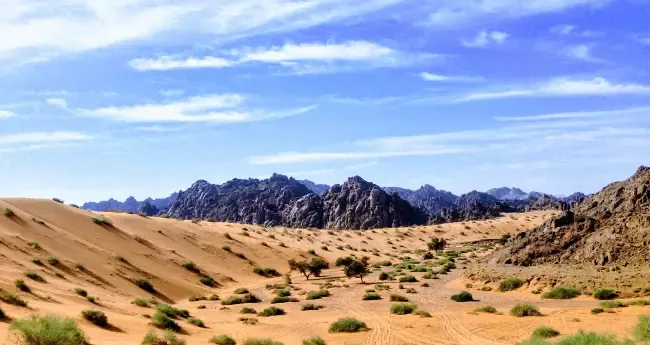
Do you need a visa to visit Mecca in Saudi Arabia?
The visa requirements depend on your nationality , even if you can proof you're Muslim. The various visas include:
Saudi Arabia Tourist eVisa : This electronic visa allows Muslim travelers from certain nationalities to visit the country for their Umrah pilgrimage. However, some restrictions apply, such as being unable to take holy water home.
Saudi Arabia Tourist Visa (paper visa): If you're not eligible for the eVisa, you must apply for a traditional Tourist Visa from the nearest Saudi Embassy or Consulate .
Saudi Arabia Umrah Visa : This is a special visa for Umrah pilgrims. While it involves more required documents, you have more freedom within the Umrah privileges.
Saudi Arabia Hajj Visa: This is a special visa for Hajj pilgrims. A trip and accompanying visa must be booked through a government-approved travel agency .
Hajj visas are assigned to countries on a quota basis according to the number of Muslims that live there. In recent years, additional restrictions have been placed on those who have previously been to Mecca to avoid overcrowding.
- [Saudi Arabia Electronic Visa Waiver]: At the time of writing, this visa waiver was only available to travelers from the United Kingdom, and allows Muslims to perform Umrah.
More questions about traveling to Mecca in Saudi Arabia?
If you want to learn more about the Saudi Arabia visas or have questions about the application process, we’re here to help. Our dedicated online team of customer service agents is available via online chat to assist with any questions, or you can contact us on WhatsApp .
Related Articles
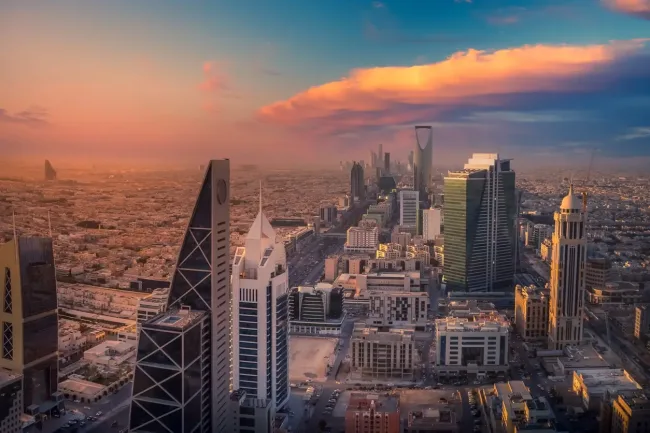
Saudi Arabia Visa status: Track your application
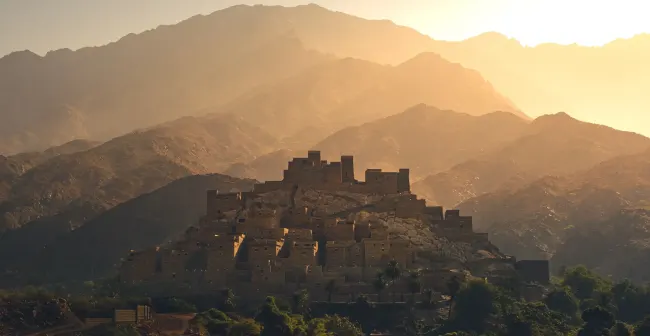
How to get the Saudi Arabia eVisa or visa waiver as a UK citizen
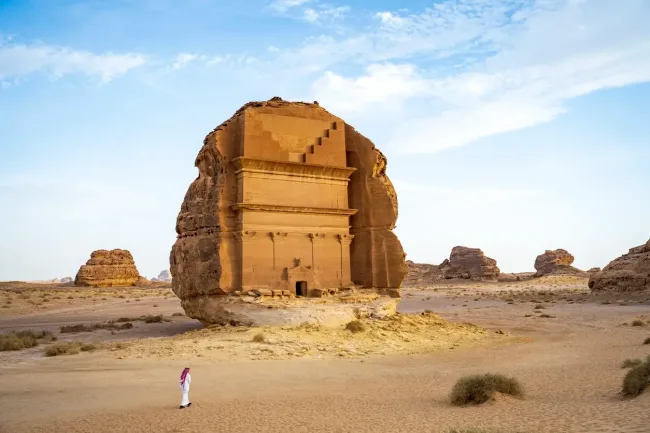
Saudi Arabia Tourist Visa for Pakistani Citizens: Apply for your visa now
- World Politics
Hajj, the Islamic pilgrimage to Mecca, explained for non-Muslims
It’s like Burning Man, but for Muslims. Okay, it’s nothing like Burning Man.
by Jennifer Williams

At this moment in mid-August, 1.5 million people from dozens of countries around the world are in Mecca, Saudi Arabia, to perform the hajj, the Islamic religious pilgrimage.
It’s a huge event — in terms of both its significance in Islam and the massive logistical challenge of having that many people from all walks of life and every corner of the globe descend on one relatively small place all at once.
But what actually goes on at the hajj? What is its religious and political significance? How do they handle all those people? And what is inside that big black box?
We've got you covered: Here are the most basic answers to the most basic questions about the hajj.
What is the hajj?
The hajj — Arabic for “pilgrimage” — is a five-day religious pilgrimage to Mecca and nearby holy sites in Saudi Arabia that all Muslims who are physically and financially able must perform at least once in their lives. It is one of the five pillars, or duties, of Islam, along with the profession of faith in the one God and Mohammed as his prophet, prayer, charitable giving, and fasting during the holy month of Ramadan .
The hajj takes place only once a year, in the 12th and final month of the Islamic lunar calendar; pilgrimages to Mecca made at other times in the year are encouraged but do not count as the hajj. Because the Islamic lunar calendar is about 11 days shorter than the 365 days of the standard Gregorian calendar, the timing of the hajj moves backward each year.
Over the five days of the hajj, pilgrims perform a series of rituals meant to symbolize their unity with other believers and to pay tribute to God. On the last three days of the hajj, pilgrims — as well as all other Muslims around the world — celebrate Eid al-Adha, or the Festival of Sacrifice. This is one of the two major religious holidays Muslims celebrate every year. (The other is Eid al-Fitr, which comes at the end of Ramadan.)
At the end of the hajj, pilgrims return home and are often given the honorific “hajji,” meaning one who has performed the hajj. (One interesting note here: During the Iraq War, US troops frequently used the term “hajji” as a derogatory term for any Iraqi, Arab, or other person of Middle Eastern or South Asian descent. So although they certainly didn’t mean it this way, and it almost certainly wasn’t taken this way by the person on the receiving end of the slur, US troops were inadvertently applying a term of respect and honor to these individuals.)
What is the religious significance of the hajj?
People may be surprised to learn that the hajj has very little to do with the Prophet Mohammed. Rather, it mostly commemorates events in the life of the Prophet Ibrahim — that is, Abraham. Yes, that Abraham.
If you’re from a non-Abrahamic faith tradition or if it’s just been a while since Sunday school, Abraham is a venerated patriarchal figure in Judaism, Christianity, Islam, and the Baha’i faith. He is perhaps best known for being willing to personally kill his beloved son when God commanded him to do so. At the last minute, so the story goes, God stepped in and told Abraham to sacrifice an animal instead, rewarding Abraham’s unwavering faith.
In the Judeo-Christian narrative, the son Abraham almost sacrifices is Isaac. In Islam, however, it’s Abraham’s other son, Ismail (Ishmael), who is almost sacrificed. Muslims consider both Abraham and Ismail to be prophets of God, and Mohammed’s ancestry is said to be traced back to Ismail.
There is another event involving Ismail and his mother, Hagar, that looms large in the hajj. The story goes like this: God commanded Abraham, as a test of faith, to take Hagar and the infant Ismail out to a barren desert area located between the two hills of Safa and Marwah in Mecca, and leave them there alone with only basic provisions. Eventually the water ran out, and the increasingly frantic Hagar ran back and forth from hill to hill seven times searching for water for her parched child.
Then a miracle occurred: A well, later called the Zamzam well, sprang from the ground, saving both of them. The story of how the well was discovered differs: Some accounts say it was the baby Ismail’s distressed kicking of his feet that scratched away the dirt and revealed the water source. Other accounts hold that the angel Gabriel (Jibril in Arabic) tipped his wing into the dirt to reveal the well.
Abraham and Ismail later went on to build the Kaaba, the black cuboid structure in Mecca that Muslims face when they pray, together, as a place of worship of the one God. (Abraham eventually came back and retrieved his family from the desert, evidently.)
Soon after they built the Kaaba, tradition holds, God commanded Abraham to proclaim a pilgrimage to the site — in other words, the hajj — to all mankind (well, all monotheists) so that they can come together in one place to show their devotion to God.
Okay, seriously, what’s the deal with the big black cube?
Muslims around the world face the direction of the Kaaba — Arabic for “cube” — when they pray, but they don’t worship the Kaaba (or the Black Stone). Rather, it is a place of worship of the one God. It is also a focusing mechanism, a central point on the globe toward which all Muslims, in a symbol of unity, direct their thoughts and prayers to God.
According to Islamic tradition, the site of the Kaaba was originally a sacred place where angels would worship God in the days before man was created. Later, Adam (yes, that Adam, partner to Eve) built a shrine to God on that spot, but it too was destroyed by the ravages of time. When Abraham came along, he and his son Ismail rebuilt the Kaaba on the foundations of Adam’s earlier shrine as a place of worship of the one God.
The structure consists of four walls and a roof, all made from stone from the hills surrounding Mecca. The four corners roughly face the four points of the compass. The building is often referred to as a “cube” (that’s where “Kaaba” comes from, after all), but this is not technically correct. To be a true geometric cube , all its edges must have the same length, and every corner in the cube must have an angle of 90 degrees.
The Kaaba’s edges are not all the same length, so therefore it is best described as a “cuboid,” not a “cube.” It is covered by a black silk cloth decorated with verses of the Quran in gold-embroidered Arabic calligraphy. This cloth is known as the kiswah, and it is replaced yearly, on the second day of the hajj.
While Abraham was building the Kaaba, so the legend goes, the angel Gabriel came down and gave Abraham the famous Black Stone, which he placed in the eastern corner of the structure.
There is another squarish stone on the ground a few feet away from the Kaaba with what look like two footprints in it. This is known as the Station of Abraham and is said to be the stone where Abraham stood while watching over the construction of the Kaaba. Today it is encased in a beautifully ornate golden glass-and-metal structure.
There is a famous story in Islam about Mohammed and the Black Stone. By Mohammed’s time, the Kaaba had again been damaged and was being repaired (it has been damaged or destroyed and rebuilt or repaired numerous times over the centuries). The story goes that when construction was finished and it came time to place the Black Stone back in the eastern corner, the final step, the tribes of Mecca argued fiercely over who would get to do the honors.
They decided to ask the next man who walked by to decide for them, and that man happened to be Mohammed. His solution was to put the stone on a large cloth and have each of the leaders of the four tribes hold a corner of the cloth and carry the stone to its place. Mohammed himself then placed the stone into its final position.
This was back before Mohammed had received his first revelation from God. The next time Mohammed was involved with the Kaaba, though, would prove to be much less ... harmonious.
Islamic tradition holds that although Abraham built the Kaaba to worship the one God, over time the Kaaba had been more or less co-opted by the various pagan tribes in the area, all of whom had placed idols to their preferred deity inside the Kaaba, thereby “corrupting” it.
One particularly popular idol was a figure of Hubal, a moon deity worshipped by many in Mecca at the time. Access to the Kaaba (and thus the idol) was controlled by the powerful Quraysh tribe, of which Mohammed was a member, and they basically capitalized on this to get rich, charging fees and selling wares to pilgrims coming to worship the idol.
When Mohammed began receiving revelations from God (he received his first one about five years after the incident with the Black Stone) and preaching his message of monotheism, the rich Qurayshi merchants started getting a little antsy. Worried that the growing popularity of his decidedly anti-idol worshiping message could potentially hurt business, they ran Mohammed and his small band of followers out of town.
Ten years later, Mohammed and his now much larger and more powerful army of followers defeated the Quraysh tribe and took control of Mecca. One of Mohammed’s first acts upon taking control of the city was to go into the Kaaba and smash the idol of Hubal and the hundreds of other idols to pieces, rededicating the shrine as a place of worship of the one God.
Today, the Kaaba is kept closed during the hajj because of the overwhelming number of people, but those who visit the Kaaba during other times of the year are sometimes allowed to go inside. It’s quite beautiful: The walls are white marble on the lower half and green cloth on the upper half. There is very little inside it, though — just three tall stone pillars, a small table, some hanging lamp–looking things, and a staircase to the roof.
Oh, and aliens.

Just kidding.
What are the main rituals performed during the hajj?
The most well-known ritual is the tawaf (literally “circumambulation”), during which pilgrims circle the Kaaba counterclockwise seven times at both the very beginning and the very end of the hajj. Although it’s not entirely clear exactly why it’s seven specifically, many believe it has to do with the motion of celestial bodies. Seven is also a prominent number associated with the divine in many religions, including Christianity and Judaism.
Other rituals include a ceremony where pilgrims throw small pebbles at three large stone walls, called jamarat, to symbolize the stoning the devil that tempted Abraham to defy God, and the slaughtering of an animal (usually a sheep) to honor the animal Abraham slaughtered instead of his son.
The meat is then given to feed the poor and needy. These days, pilgrims frequently elect to purchase tokens to have an animal slaughtered for them.

There is also a ritual called Sa’ee, in which pilgrims walk back and forth between the two hills of Safa and Marwah seven times to commemorate Hagar’s frantic search for water for her infant son.
Today, both hills are enclosed within the Masjid al-Haram (Sacred Mosque) complex (which also houses the Kaaba), and the path between the hills is a long, beautiful indoor gallery with marble floors and air conditioning. Many also drink from the Zamzam well located there.
The only ritual that is solely related to Mohammed is the climbing of Mount Arafat, which is where Mohammed preached his last sermon. On the second day of hajj, pilgrims wake at dawn and walk a short distance to Mount Arafat, where they spend the remainder of the day on or near the mountain in quiet worship and contemplation of God.
Can non-Muslims do the hajj?
No. Although Christians and Jews believe in the God of Abraham, they are not allowed to perform the hajj. Indeed, the government of Saudi Arabia forbids all non-Muslims from entering the holy city of Mecca at all.

The Saudi government takes this very seriously, so the odds that a non-Muslim would be able to slip in unnoticed among the throngs of pilgrims undetected or pretend to be Muslim and get in that way are extremely small. It’s not completely impossible — it has happened a handful of times over the centuries — but given the millions who attend every single year, the rate of success is miniscule. The Saudis have been doing this for a long time, and they’re not idiots.
Legal entry into the country is extremely tightly controlled, and the paperwork required to get a hajj visa is incredibly detailed. Pilgrims must book their hajj trip through a Saudi government–approved hajj travel agent. For a Western Muslim convert to be allowed to go on hajj, he or she must present documentation from an imam (Muslim religious leader). The imam must testify in writing that he knows the person in question and that the person is a true convert.
Trying to come in on a regular tourist visa and then stealthily making your way to Mecca is also a nonstarter. Getting a tourist visa as a Westerner is notoriously hard, and the likelihood of you being able to just slip away from your Saudi government minder and travel undetected all the way from the capital Riyadh to Mecca — more than 500 miles away, on the other side of a vast desert — is basically laughable.
The only way for a non-Muslim to get in is essentially to play the long con, pretending to convert to Islam seemingly sincerely enough to convince the local imam that you’re for real. That has happened before: In 2015, WND published a three-part series written pseudonymously by someone who claimed to be a white British non-Muslim man who successfully fake-converted to Islam and went on hajj.
So it’s not impossible. But you have to really, really, really want to go to all that trouble and risk potentially being deported and banned from the country (not to mention causing a major international incident and pissing off just about every Muslim on the planet) just to get into a city to see some sites that aren’t even of religious significance to you.
What about women and children?
Parents may choose to bring even their very young children with them, but the hajj won’t “count” toward fulfilling the child’s personal religious obligation, as that requires the child to be mature enough intellectually and spiritually to understand the significance of the hajj.
Women are also allowed — indeed, required, just like every other physically and financially able Muslim is — to perform the hajj. However, they have to be accompanied by an appropriate male guardian (called a mahram). Here are the rules, per the US State Department:
Women below the age of 45 must be accompanied by a “mahram” (e.g. close adult, male relative such as a husband, son, father, or brother) for Hajj. Women must be met by their sponsor upon arrival. Women who are traveling alone and not met by sponsors have experienced delays before being allowed to enter the country or to continue on other flights. Women over 45 may travel without a mahram in an organized group, provided they submit a notarized letter of no objection from the husband, son, or brother, authorizing travel for Hajj with the named group. Violators face deportation.
Women who are members of the minority Shia sect of Islam (the majority of the world’s Muslims are Sunni), on the other hand, are not required by Saudi authorities to have a mahram when attending hajj and are allowed to travel alone. This is likely because Shia scholars have, unlike Sunni scholars, ruled that a woman may travel alone on hajj if she feels that she will be safe.
And since it’s basically impossible to talk about women in Islam these days without someone bringing up the issue of how much clothing they’re required (or not required) to wear, here’s a fun fact: Although women must cover their hair with a scarf, the face veil, known as a niqab, and the burqa, the garment that covers from head to toe with only a mesh-like panel through which to see, are not allowed during hajj.
Yes, you read that right: The two pieces of clothing that are the most controversial and are seen by many anti-Islam critics as symbols of the pervasive and pernicious cultural intrusion of Islam and its inherent oppression of women, are not allowed during one of Islam’s most sacred rituals, even though men and women mix freely during it.
Some women still wear them, though, despite the prohibition, and it doesn’t seem to be something that’s actually enforced. Some have also come up with rather creative workarounds, such as wearing large, darkly tinted sunglasses and those paper face masks doctors wear.
So why the prohibition? The reason is basically that while Mohammed’s various statements regarding women’s dress are hotly debated among Muslim scholars (Mohammed lived a long time, after all, and he said a lot of things over the course of his life), his statement on women not covering their faces (or hands) during hajj is crystal clear: A woman in the state of ritual purity for hajj “should not cover her face or wear gloves.” Not a whole lot of room for debate there (though, of course, people still do debate it, because humans).
Men also wear special clothing during hajj. Male pilgrims wear two pieces of clean, unstitched cloth (usually plain white) — one wrapped around their waist and one wrapped around their torso — and plain sandals. The purpose of making all men dress in this same simple garb is to strip away all indications of wealth and status so that all pilgrims are seen as equal, as they are in the eyes of God.
How in the world does Saudi Arabia handle such a massive number of people each year?
In general, the Saudi government does a pretty good job at managing things, all things considered. But not always: Over the years, there have been many horrific examples of large numbers of people dying.
1.5 million people are attending the hajj this year. That’s way bigger than the Olympics (10,500 athletes and 500,000 foreign tourists went to Rio for the 2016 Olympics), Burning Man (the annual gathering in the Nevada desert currently has an attendance cap of 70,000 ), and the average Taylor Swift concert combined.
It’s not the biggest world event — that honor probably goes to the Kumbh Mela Hindu religious festival held every three years in India (in 2013, some 100 million people are believed to have attended) — but it’s still pretty impressive. For instance, the Saudi government’s target for the number of people performing tawaf (circling the Kaaba seven times) last year was 107,000 an hour .
But considering there are an estimated 1.6 billion Muslims on the planet, all of whom are required to perform the hajj at least once in their lives if they are financially and physically able, the numbers could actually be a lot higher. The main reason they aren’t is because every year the Saudi government sets quotas for each country on how many pilgrims they’re allowed to send on hajj.
To manage the people who do get to come, the Saudi government has invested billions of dollars in building a vast and elaborate infrastructure in and around the holy sitesa massive hajj terminal at the main airport in Riyadh, a complex network of roads to bring pilgrims to the city of Mecca, wide foot bridges to carry the tens of thousands of pedestrians who move from place to place at preset, staggered times to minimize traffic flow (personal vehicles are prohibited, for obvious reasons, so most people walk everywhere, though some — mostly the elderly — take shuttle buses), multi-tiered galleries around the Kaaba and the jamarat (the stone walls where the symbolic stoning of the devil takes place), and more.
Perhaps the most stunning logistical feat, though, is the vast tent city at Mina, located just a few kilometers from Mecca, where more than 160,000 air-conditioned, fireproof, Teflon-coated fiberglass tents provide temporary accommodation for pilgrims. Men and women, even married couples, sleep in separate tents. The majority of the tents can accommodate about 50 people, and the average price for each pilgrim is $500, according to Al Jazeera’ s Basma Atassi.
However, luxury tents costing as much as $10,000 per pilgrim — including some equipped with jacuzzis — are available for those few wealthy enough to afford them. As Atassi writes, though, the Saudi government in recent years has taken steps to ban them, stating that they “defied the spirit of the Hajj.”

For 51 weeks of the year, the tent city, roads, and other infrastructure built to accommodate pilgrims are almost completely deserted. Then for one week each year, they seethe with humanity.
There is also an extensive security apparatus in place to monitor every aspect of the hajj — to maintain order and safety, but also to ensure that proper Islamic protocol is followed by all in attendance. This year, the Saudis have deployed tens of thousands of security forces to control crowds and help keep pilgrims safe.
Unfortunately, that same number of security forces wasn’t enough to prevent catastrophe from striking in 2015: That year, more than 2,400 people were killed when a stampede occurred at the intersection of two pedestrian walkways leading out of the tent city toward the jamarat bridge.
Though this was the deadliest hajj disaster in history, other disasters have occurred. As Al Jazeera’s Atassi notes:
A 1990 stampede inside a pedestrian tunnel killed almost 1,500 people, while stampedes in the stoning of the devil area in 1990, 1994, 1998, 2003, 2004 and 2006 claimed the lives of hundreds. The eruption of a fire in 1997 burned thousands of tents and killed over 300 people.
Health issues are also a major concern during the hajj. So many people from all corners of the globe gathering in such a small area means the chances of contagious diseases spreading through the population are very high. There is also a high risk of heat stroke, heat exhaustion, dehydration, and sunburn, especially when the hajj falls in the summer months (as it does this year). For instance, in August 1985 , 2,000 cases of heatstroke were reported, and more than 1,000 of the sufferers died within a few days.
To try to prevent this from happening, the Saudi government makes all pilgrims adhere to strict guidelines regarding vaccinations, especially for particularly contagious diseases such as meningitis. Pilgrims are also advised to drink lots of water and to be mindful of the perils of the blistering desert heat.
The Saudi government also provides complimentary water distributed from refrigerated trucks, air-conditioned tents at Mina, large sun-blocking canopies, and thousands of fine-mist sprinklers, according to the US Centers for Disease Control and Prevention .
Medical facilities are also available in and around the main hajj sites. As Asaad Shujaa and Sameer Alhamid write in the Turkish Journal of Emergency Medicine , in 2012 there were 25 hospitals with 4,427 bed capacity (500 critical care and 550 emergency care) and 141 health centers with 20,000 qualified specialized personnel. They also note that all health care is provided at no cost to all pilgrims.
And, finally, there’s the politics.
Saudi Arabia and Iran have for years been in a sort of proxy struggle for dominance of the Middle East and the broader Muslim world. Saudi Arabia's government is officially Sunni, and Iran's is officially Shia. Both countries frequently exploit this by pushing a sectarian worldview of Sunni versus Shia. And that often comes to a head over the hajj.
The political legitimacy of the Saudi royal family rests largely on its religious credentials, which it gets at home from the support of the country's ultra-conservative Wahhabi religious establishment, and internationally from being the "custodian" of the two holiest places in Islam, the Prophet Mohammed's mosque in Medina and Masjid al-Haram in Mecca.
Iran, then, has long sought to portray the Saudis as incompetent custodians in an effort to damage their credibility, and has even called for an international body to take over administration of these places. When a horrific stampede occurred at the 2015 hajj, Iran jumped at the chance to blame the Saudis.
More than 400 Iranian pilgrims were reportedly killed in the incident. But before most of the victims had even been identified, Iranian leaders issued statements blaming the Saudis for the accident.
Iran’s Supreme Leader Ayatollah Khamenei stated , “The Saudi government is obliged to accept its heavy responsibility in this bitter incident and meet its obligations in compliance with the rule of righteousness and fairness; mismanagement and improper measures that were behind this tragedy should not be undermined,” and declared three days of mourning for the victims of the stampede.
The fight bled into the 2016 hajj. Khamenei issued a blistering statement on his website calling the Saudis murderers for their handling of the stampede last year and suggesting they may even have caused the stampede on purpose:
Saudi rulers were at fault in both cases. This is what all those present, observers and technical analysts agree upon. Some experts maintain that the events were premeditated. The hesitation and failure to rescue the half-dead and injured people, whose enthusiastic souls and enthralled hearts were accompanying their praying tongues on Eid ul-Adha, is also obvious and incontrovertible. The heartless and murderous Saudis locked up the injured with the dead in containers- instead of providing medical treatment and helping them or at least quenching their thirst. They murdered them.
Not to be outdone, Saudi Arabia’s top religious leader struck back, accusing the Iranians of being pagan fire worshipers, not Muslims. From Al Jazeera :
In comments to the Makkah newspaper published on Tuesday, Saudi Arabia's Grand Mufti Abdulaziz Al Sheikh was quoted as saying that Khamenei's remarks blaming Riyadh for last year's tragedy were "not surprising" because Iranians are descendants of Magi. Magi refers to Zoroastrians and those who worship fire. Predating Christianity and Islam, Zoroastrianism was the dominant religion in Persia before the Arab conquest. "We must understand they are not Muslims, for they are the descendants of Majuws, and their enmity towards Muslims, especially the Sunnis, is very old," Saudi's grand mufti said, according to the AP news agency.
The Iranians also decided to bar their citizens from attending the hajj at all last year, claiming the Saudis failed to adequately guarantee the safety of Iranian pilgrims and accusing them of having “blocked the proud and faithful Iranian pilgrims’ path to the Beloved’s House [the Kaaba].” The Saudis, of course, blamed the Iranians , arguing they had refused to sign the agreement both sides had reached over the 2016 hajj:
“Saudi Arabia does not prevent anyone from performing the religious duty,” the Saudi foreign minister, Adel al-Jubeir, said at a news conference with his visiting British counterpart, Philip Hammond. “Iran refused to sign the memorandum and was practically demanding the right to hold demonstrations and to have other advantages … that would create chaos during hajj, which is not acceptable,” he added.
Whoever’s fault it was, no Iranian pilgrims were allowed at the hajj in 2016. In 2017, however, Iran lifted the ban, and around 80,000 Iranians performed the hajj that year.
And there are tons of Shia Muslims from other countries, too. For the most part, Sunni and Shia pilgrims on hajj get along just fine — despite the best efforts of the governments of Iran and Saudi Arabia to stir up sectarian tension every year for geopolitical gain.
That Sunni and Shia pilgrims come together as brothers and sisters in Islam during the hajj is a powerful reminder of how religion can unite people as well as divide them. Pilgrims planning to go on hajj are advised to avoid conflict and disagreement with other Muslims, to refrain from judging or being harsh toward others whose customs or interpretations of Islam may seem ignorant or incorrect.
Because that’s what the hajj is really supposed to be about: believers from around the world coming together, putting aside linguistic, cultural, class, and sectarian differences, and worshiping God.
Most Popular
The hottest place on earth is cracking from the stress of extreme heat, india just showed the world how to fight an authoritarian on the rise, 10 big things we think will happen in the next 10 years, take a mental break with the newest vox crossword, world leaders neglected this crisis. now genocide looms., today, explained.
Understand the world with a daily explainer plus the most compelling stories of the day.
More in World Politics

Modi won the Indian election. So why does it seem like he lost?

Kate Middleton’s cancer diagnosis, explained

What happens if Gaza ceasefire talks fail


The US tests Putin’s nuclear threats in Ukraine

It’s not Islamophobia, it’s anti-Palestinian racism

India’s election shows the world’s largest democracy is still a democracy

I know I’m supposed to be investing. How do I start?

The golden age of retail loyalty programs is here

This is your kid on smartphones Audio

Cities know how to improve traffic. They keep making the same colossal mistake.

- Give Your Zakat
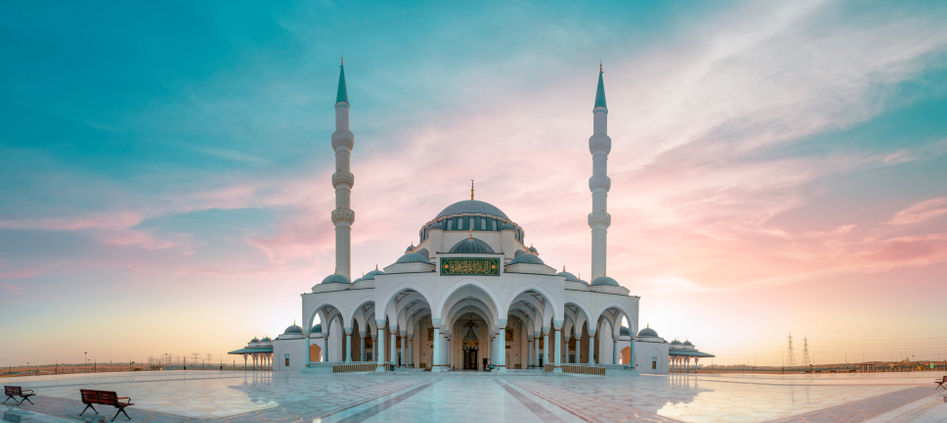
Are non-Muslims Allowed to Enter Mecca and the Sacred Mosque (Haram)?
Answered by: Ustadh Faraz A. Khan
Question: Why can’t non-Muslim, Jews and Christians, enter Mecca or the Haram?
Answer : Assalamu alaikum wa rahmatullah,
I pray this finds you in the best of health and faith.
The short answer to your question is that historically there was disagreement among jurists with respect to the matter. Abu Hanifa’s opinion was that non-Muslims can enter Mecca and even the Sacred Mosque [haram], as long as they do not do so for the sake of the pilgrimage [hajj or umra], which they are not allowed to perform. This is the opinion of the Hanafi school of law, which historically up to today has been the largest juridical school of Islam. Other schools of thought, however, differed on the legal ruling.
The Verse in Question
This ruling is based on the Qur’anic verse, “O believers, polytheists are not except filth, so let them not approach the Sacred Mosque after this year of theirs…” [9:28].
This verse was revealed in the 9th year after hijra, which is therefore what is meant by the phrase “this year of theirs.” The year is ascribed to them in the verse to emphasize the fact that the legal ruling therein is specific to them alone. [Ibn Ashur, Tahrir wal-Tanwir]
Most Qur’anic exegetes [mufassirun] interpreted the first statement as metaphorical, that is, polytheists are not literally filth, but their creed of associating partners with Allah Most High is so base and vile in the sight of Allah that it is akin to filth itself, so much so that it is as if those who adhere to such beliefs are themselves filth.
[Ibn Ashur, Tahrir wal-Tanwir; Alusi, Ruh al-Ma’ani; Nasafi, Madarik al-Tanzil; Abu Suud, Irshad al-Aql al-Salim; Abu Hayyan, Bahr al-Muhit; Suyuti, Tafsir Jalalayn]
Juridical Difference on the Resultant Legal Ruling
As for the legal ruling derived from the verse, as mentioned above there was disagreement among jurists historically.
Imam Shafi’i interpreted the verse to mean that after that year, polytheists were not allowed to enter the Sacred Mosque of Mecca, yet they could enter other mosques, as only the Sacred Mosque was specified in the verse. This was the opinion of Imam Ahmad ibn Hanbal as well.
Imam Malik understood the verse to be more general and therefore maintained that polytheists could not enter the Sacred Mosque of Mecca nor any mosque whatsoever.
Also, according to Imams Shafi’i, Malik and Ahmad, the term “Sacred Mosque” used in the verse linguistically refers to the entire Sacred Precinct, that is, all of Mecca as well as its outlying areas; hence, the legal ruling of barring non-Muslims from entry would apply to that whole area, not just the Sacred Mosque of Mecca.
Imam Abu Hanifa understood the verse to refer only to the actual pilgrimage, not to mere entrance, and therefore maintained that polytheists could enter any mosque, even the Sacred Mosque of Mecca. According to him, they simply could not perform the pilgrimage, neither hajj nor umra, as was customary among the polytheists of Mecca before the revelation of the above verse.
[Jassas, Ahkam al-Qur’an; Alusi, Ruh al-Ma’ani; Qurtubi, Jami’ li Ahkam al-Qur’an; Shirazi, al-Muhadhdhab; Nawawi, Majmu’; Ibn Abidin, Radd al-Muhtar; Kasani, Bada’i al-Sana’i; Buhuti, Kashshaf al-Qina’]
All of Humanity is Honored
However, regardless of this particular ruling and the Islamic view of polytheism as a creed, people that adhere to such beliefs are still our brothers in humanity, and all humans are honored by Allah as they are children of Adam and Allah’s vicegerents on earth. Muslims are commanded to treat all humans – whether Jews, Christians, Hindus, Buddhists, polytheists, atheists, or otherwise – with respect, dignity, and mutual regard.
Allah Most High states, “And We have indeed honored the children of Adam,” [17:70] i.e., all of humanity, irrespective of differences in creed.
He Most High also states, “O humanity! We have created you all from a male and female, and We have made you into nations and tribes so that you may come to know one another…” [49:13] Our differences, then, are merely a platform upon which we, as brothers in humanity, can have civil dialogue and open the doors of communication so as to come to know one another.
Furthermore, it is rigorously authenticated that our Beloved Messenger [peace and blessings be upon him] said, “The believer is one from whom all of humanity feels safe.” [Sahih Ibn Hibban; Mustadrak Hakim; Musnad Ahmad] Therefore according to the Prophet himself, the very definition and hence nature of the believer entails providing safety and security to all of humanity.
He also said, “I was sent to perfect good character,” [Mustadrak Hakim; Sunan Bayhaqi], and according to Islamic creed, he [peace and blessings be upon him] was sent not just to the Arabs, but rather to all of humanity. The prophetic perfection of character, then, is directed towards humanity at large. This is further echoed by the Qur’anic verse, “And We have sent you not except as a mercy to all of creation.” [21:107]
Out of emulation of the Prophet, Muslims are therefore commanded to reflect prophetic mercy to all humans, creedal differences aside.
And Allah alone gives success.
wassalam Faraz A. Khan
Related Posts
Is there a time limit to gain obligatory knowledge once morally responsible – shaykh irshaad sedick, what is the ruling in having proper manners with allah – shaykh irshaad sedick, what is the ruling regarding the kissing of the hands of scholars -shaykh abdul-rahim reasat, what is the process of becoming a sufi – shaykh abdul-rahim reasat.
Accessible to all, supported by you
Learn With Us
- Course Catalog
- Live Schedule
- Student Login
Seek With Us
- Ask a Question
Get to Know Us
- Our Reports
- Privacy Policy
Get Free Courses & Prophetic Guidance in Your Inbox
Email Address *
- Mecca Tourism
- Mecca Hotels
- Mecca Guest House
- Mecca Holiday Homes
- Mecca Flights
- Mecca Restaurants
- Mecca Attractions
- Mecca Travel Forum
- Mecca Photos
- All Mecca Hotels
- Mecca Hotel Deals
- Last Minute Hotels in Mecca
- Things to Do
- Restaurants
- Holiday homes
- Travel Stories
- Add a Place
- Travel Forum
- Travellers' Choice
- Help Centre
Can non-muslims visit Mecca? - Mecca Forum
- Middle East
- Saudi Arabia
- Makkah Province
- Mecca
Can non-muslims visit Mecca?
- India Forums
- United States Forums
- Europe Forums
- Canada Forums
- Asia Forums
- Central America Forums
- Africa Forums
- Caribbean Forums
- Mexico Forums
- South Pacific Forums
- South America Forums
- Middle East Forums
- Honeymoons and Romance
- Business Travel
- Train Travel
- Traveling With Disabilities
- Tripadvisor Support
- Solo Travel
- Bargain Travel
- Timeshares / Holiday Rentals
- Makkah Province forums
- Mecca forum

Hello fellow travelers,
58 replies to this topic

They cannot know or it is not written anywhere and even you don't need to prove it if you are caught, this rule is more exemplary or announced as a symbol for the place that is just dedicated to specifically Muslims. This is a sort of contentment area for Muslim worship.
The main reason I think behind this is not that they want to distinguish or prefer Muslims from Non-Muslims but it is due to the crowd handling because it is very hard to even handle Muslims in that small area, Previously they had implemented 2000 SAR extra for Muslims who want to do umrah twice a year to manage the crowd Plus they have specific quota for every country that more than that number of people cannot visit in a year, every year they keep a specific number of people allowed for Hajj. so It's just that they want to entertain Muslims only for their Pilgrimage.

If this is the current policy, that Non-Muslims can go to Medina and Mecca, but not enter the mosques, that seems like a logical policy change, in my opinion. Keeping Non-Muslims out of both cities seemed too restrictive and extreme.
Have you seen any more sources in addition to this one article posted under one of threads?
This post on Salaam Gateway was posted at the beginning of March. I personally passed Mecca twice later and saw signs "Muslims only".
I'm sure that you can still "accidentally" end up at the gates of Haram mosque at Mecca but there are no changes of official rules about visit to Mecca for non-Muslims.
Vatse, I certainly respect your opinion because it seems you were in Medina recently as a Non-Muslim. But I don't think there will be an official announcement.
I checked with a friend who, as a Non-Muslim, visited Medina in 2019, with a tourist visa when the evisa program started. The Muslims Only signs were still up on the roads into Medina at that time, but he was told that he could go everywhere in the city, except the mosque. Then, in 2021, the Muslims Only signs came down.
It seems that this gradual, quiet relaxing of the restrictions is the plan. And it is almost certainly connected to Project 2030. The idea is to turn KSA into a bigger version of the UAE. I think it is a brilliant idea, because KSA has a lot more to offer in terms of tourist attractions than the UAE.
I don't think that Medina and Mecca are intended to be tourist attractions for Non-Muslims but, outside of the Hajj period, Non-Muslim tourists will be tolerated as part of the general less-restrictive policy shift.
And, just in my opinion, it will be a good thing for Islam if Non-Muslims are allowed into these cities and learn a little more about the culture and religion, and respect the devotion of the followers.

One day, a couple of local friends randomly said that they had to buy some goods in Makkah ; I was with them, and asked them if it was ok to visit. They said, as long as you look like you're playing a mobile phone game at the (1) checkpoint from Jeddah, then there's no issue.
Sure enough, the apathetic guard didn't even care.
However, once by Masjid al-Haram, I didn't venture in, out of respect. You can tell that you're entering the site because the ground changes from a road to white tiling.
If I remember correctly then you are planning to visit at winter. So there may be some more information coming in starting from autumn when international tourists are starting to come back after hot summer. And if there is still very few new information then you can just give a try during your tour. If noone cares at checkpoint then you can try to get a room with few to Haram mosque and it would be nice experience. And if they don't allow you through checkpoint then you can just continue your tour. At current situation under MBS I'm sure that noone punish you severely if someone decides that you still can't wonder around Mecca even outside of mosque complex. They probably just lead you out from city if you apologize and tell that you didn't saw these signs due to heavy traffic or something like this :)
Medina is actually coming up on tours promoted for non-Muslims. It's a common stopover between Al-Ula and Jeddah . I'm not sure if they usually make somekind of city tour also or just use cheap 4* and 5* hotels for a night. And I have seen also leaflets promoting different religious and non-religious sites of Medina stating which of these can't be entered by non-Muslims. There are some very nice non-religious projects opened and planned around city which would be very happy to attract non-Muslim tourists also. Maybe they try out how it works if more non-Muslim tourists visit Medina and then they can give a try for Mecca also. Most of things at this kingdom depend on thoughts and ideas of MBS anyway.
And I also think that opening up of these cities would be great promotion for Islam. If you accept respectful tourists who are happy to learn about local history and see these famous places then they get much better understanding about this.
Any updates on this? Recent experiences?
^^ mention of irony
- Umrah after Hajj 08 June 2024
- Eid ul Adha prayer in Makkah Grand mosque 07 June 2024
- Umrah alone - Single woman 03 June 2024
- Nusuk Permit check 29 May 2024
- Umrah and visa headache 28 May 2024
- Foot outlets in Makkah and Madinah 28 May 2024
- Meeqat question 27 May 2024
- Vaccination Query for Umrah Travel to Saudi on the 28th 27 May 2024
- Umrah after many yrars 27 May 2024
- Makka to Jeddah airport 27 May 2024
- Can you do either makkah ok tourist visa during hajj season 27 May 2024
- Check in luggage in stopover umrah 27 May 2024
- Umrah with kids in july after hajj 22 May 2024
- DIY umrah from UK 21 May 2024
- Booking Makkah or Madinah hotels onlines for Umrah 6 replies
- Hajj 2011 - Retaj Hotel/Suite in Mecca 21 replies
- Umrah 2013 15 replies
- hotels distance from Masjidil Haram 6 replies
- Agents for Umrah Visas only 302 replies
- Car park near haram 6 replies
- Booking Makkah hotel for Hajj 5 replies
- Hajj Time Hotel Booking in Mecca & Madinah 2 replies
- Tips for umrah 28 replies
- Mecca - Kidney Dialysis Treatment 29 replies
Mecca Hotels and Places to Stay
- Can Non Muslims visit Makkah?
- Can we Perform Umrah on Saudi Tourist Visa?
Security Alert May 17, 2024
Worldwide caution, update may 10, 2024, information for u.s. citizens in the middle east.
- Travel Advisories |
- Contact Us |
- MyTravelGov |
Find U.S. Embassies & Consulates
Travel.state.gov, congressional liaison, special issuance agency, u.s. passports, international travel, intercountry adoption, international parental child abduction, records and authentications, popular links, travel advisories, mytravelgov, stay connected, legal resources, legal information, info for u.s. law enforcement, replace or certify documents, before you go.
Learn About Your Destination
While Abroad
Emergencies
Share this page:
Crisis and Disaster Abroad: Be Ready
What the Department of State Can and Can't Do in a Crisis
Information for U.S. Citizens about a U.S. Government-Assisted Evacuation
Traveler's Checklist
Safety and Security Messaging
Best Practices for Traveler Safety
Staying Connected
Smart Traveler Enrollment Program (STEP)
Traveler Information
LGBTQI+ Travelers
Adventure Travel
High-Risk Area Travelers
Travelers with Dual Nationality
Journalist Travelers
Faith-Based Travelers
Pilgrimage Travelers (Hajj and Umrah)
U.S. Students Abroad
Cruise Ship Passengers
Women Travelers
Travelers with Disabilities
Older Travelers
U.S. Volunteers Abroad
Travelers with Pets
Travelers With Firearms
Travel Agents
Travel Safety - Race and Ethnicity
U.S. Travelers in Europe's Schengen Area
Your Health Abroad
Insurance Coverage Overseas
Driving and Road Safety Abroad
Customs and Import Restrictions
Information for U.S. Citizens in Russia – Travel Options Out of Russia
Lodging Safety
Paris 2024 Olympics and Paralympics
Millions of people from around the world undertake the Hajj pilgrimage to Mecca every year. Umrah is a pilgrimage that can be completed at any time of the year.
Saudi Arabia's Ministry of Hajj and Umrah offers an electronic portal for Hajj registration and bookings. The portal allows for electronic Hajj visa applications and provides additional information, such as an FAQ page and awareness guides.
In order to participate in Hajj, U.S. citizens must have a permit issued through the Saudi Arabian Ministry Website. That rule applies whether you are visiting or living in Saudi Arabia. If you participate in Hajj without a permit, you may be deported, detained, fined, or banned from future visits to Saudi Arabia.
Refer to https://hajj.nusuk.sa/ for all related information, including required vaccines and medical insurance, specific mobile apps needed to enter holy sites, and other details. Please also see the current Travel Advisory and Country Information page for Saudi Arabia.
Note: Once you arrive in Mecca for Hajj, you must get permission from the Ministry of Hajj and Umrah to leave Saudi Arabia early, before the completion of Hajj.
Personal Security
Travelers seeking to perform Hajj and Umrah are often targets for scammers. Watch out for dishonest guides or people pretending to be tour operators, who may leave pilgrims stranded without paying their bills. Also, be cautious of hotels that demand fees to return passports.
There are reports of pickpocketing, theft, and other crime in Mecca, particularly in the area of the Grand Mosque. There are also reports of crime in Medina, where there are large crowds of people. Always carry contact information for your hotel and tour operator.
Keep travel documents (your U.S. passport or U.S. “green card” residency permit) secure during your trip. Make two copies of your passport—including pages stamped with Saudi visas—with one saved digitally and the other in a safe place while you travel.
Emergency Contact Information for U.S. Citizens
- U.S. Embassy Riyadh: (966) (11) 835-4000
- U.S. Consulate General Jeddah: (966) (12) 220-5000
- U.S. Consulate General Dhahran: (966) (13) 839-5700
Between 8:00 a.m. to 5:00 p.m. local time in Saudi Arabia, Sunday through Thursday, ask for the American Citizen Services Unit. For emergency cases outside of those hours or during holidays, use the same numbers listed above to reach a duty officer for assistance.
Visa Information
The Hijri calendar is used in Saudi Arabia for all official functions. Please review the dates on your visa carefully, and make sure you know when it expires.
Do not overstay your Hajj or Umrah visa . If you stay in Saudi Arabia longer than you are allowed, you may have to pay fines in order to depart the country. Fines can be thousands of dollars. You might also be held in detention until your deportation proceedings. Additionally, you could be banned from returning to Saudi Arabia in the future.
Permitted areas of travel and duration of stay: If you are unsure, ask Saudi airport officials or the Passport Office (jawazat) for clarification upon arrival.
- Hajj and Umrah (pilgrimage) visas are not valid for work or residency .
- Non-Muslims are forbidden to travel to Mecca and the portions of Medina which are considered sacred.
- All pilgrims visiting for Hajj must leave Saudi Arabia after the completion of Hajj.
Women Pilgrims
Women can register for Hajj without a male guardian if they go in a group with other women.
Travelers With Disabilities
Be prepared for standards of accessibility and accommodation below the minimum of what is required in the United States. While most of the Holy Sites, such as the Grand Mosque in Mecca, are accessible to disabled people , most hotels and transportation options are not. Check with your tour group provider to ensure your needs are well known and can be accommodated.
Photographs
You are not allowed to take photos (still or video, even with your phone) at the Holy Mosque in Mecca or the Prophet's Mosque in Medina. If you break this rule, your device may be taken away.
Safety and Emergency Information
Enroll in the Smart Traveler Enrollment Program (STEP) to receive security messages and make it easier to locate you in an emergency.
Follow us on Twitter @KSA_ACS and @TravelGov as well as the U.S. Mission Saudi Arabia , Consulate General Jeddah , and Bureau of Consular Affairs Facebook pages.
Emergency Contact Information for Hajj Authorities
- The National Tawafa Company for Pilgrims of Turkey and Muslims of Europe, Americas, and Australia Telephone: +966-920-012-013 Fax: 966-920-006-620 Website: http://www.teaa.com.sa/ Street Address: Mecca Al Mukarramah, Al Nuzha Road, near Alnuzha Bridge
- Health Affairs : 012-530-8812
- Lost Pilgrims: 012-530-8813
- Emergency Services : For all emergencies including ambulance service call 911.
What The United States Government Can and Cannot Do
We hope you have a trouble-free hajj or umrah like thousands of other pilgrims from the united states do every year. if something goes wrong, u.s. embassy riyadh and consulate general jeddah can help you with consular services, such as:.
- Arranging for emergency U.S. passports and “boarding foils” for lost I-551 (“green cards”) for U.S. Lawful Permanent Residents. After Hajj, please bring a report from the police station regarding the theft or loss, and a copy of your U.S. passport or green card if possible.
- Seeking to contact you within 24 hours of being told that you have been arrested .
- Providing contact information for local lawyers and hospitals.
- Arranging for a spouse or next of kin to be informed if you are involved in an accident, are arrested, or die, and advising them on the appropriate procedures.
The U.S. government cannot:
- Arrange for travel outside of the designated areas in Mecca and Medina.
- Resolve alleged or actual immigration violations.
- Become involved in any disputes involving a travel agency, hotel, airline, or any other service provider.
- Manage airline, hotel, or other travel bookings.
- Pay for hotel, legal, medical, travel, or other bills.
- Obtain your release from prison.
- Provide legal advice or intervene in court cases or criminal investigations.
Enroll in STEP

Subscribe to get up-to-date safety and security information and help us reach you in an emergency abroad.
Recommended Web Browsers: Microsoft Edge or Google Chrome.
Learn about your destination
Make two copies of all of your travel documents in case of emergency, and leave one with a trusted friend or relative.
External Link
You are about to leave travel.state.gov for an external website that is not maintained by the U.S. Department of State.
Links to external websites are provided as a convenience and should not be construed as an endorsement by the U.S. Department of State of the views or products contained therein. If you wish to remain on travel.state.gov, click the "cancel" message.
You are about to visit:
- CONTENT FOR BUSINESS
- [email protected]
- Español
- Français
- Português
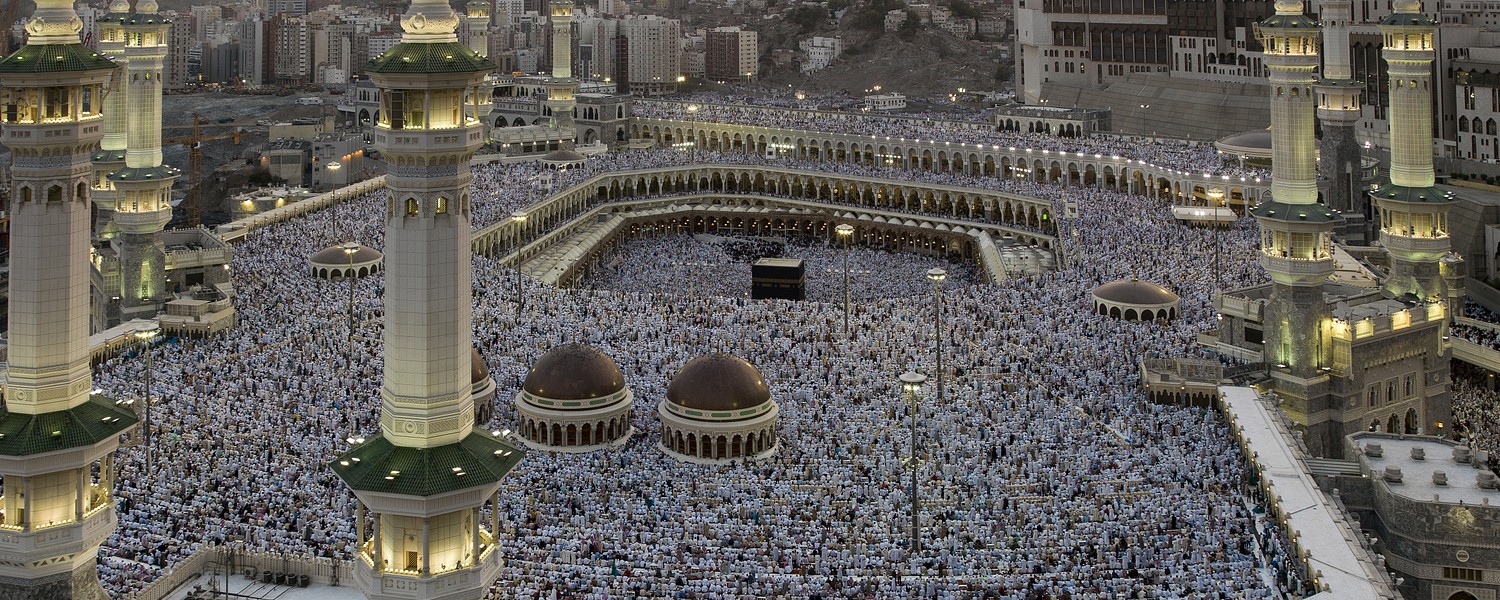
- Tourist Information

Our travel guides are free to read and explore online. If you want to get your own copy, the full travel guide for this destination is available to you offline* to bring along anywhere or print for your trip.
Limited time: €2
- View on map
- Do & See
- Restaurants
- Bars & Nightlife

Can I visit Mecca as a Tourist?

Cultural Norms

Passport / Visa

Best Time to Visit

King Abdulaziz International Airport (JED)

Public Transport

Post Office

Electricity

Next Section

To remain relevant to young Muslims, mosques must become more inclusive spaces for women
Director, McEwen School of Architecture, Laurentian University
Disclosure statement
Tammy Gaber received funding from the Social Sciences and Humanities Research Council of Canada.
View all partners
I was widowed at a fairly young age, and as a Muslim woman and single mother it was my responsibility to take my children — a son and a daughter — to the mosque on Fridays, to find solace and to pray.
However, each time I was forced to be separated from my son. He would go to the larger men’s prayer hall, while my daughter and I went to the separate women’s section. He was a child, and I had no way of knowing how or where he was until the prayer was over.
In the throngs of men exiting the prayer hall I would search for him. The stress and anxiety of being separated from him ultimately led me to stop going with them to the mosque for a period of time.
I’ve spent over half of my life studying the place and space of women in mosque architecture. My book, Beyond the Divide A Century of Canadian Mosque Design , documents 90 mosques across Canada and the spaces for women within them.

Women in mosques
The mosques I grew up using in Canada were very different from the historical ones, and the Grand Mosque in Mecca, that I visited as a young scholar. In the few Canadian mosques of my youth, the space for women was always a surprise and in constant flux: a side room, a basement, a backroom — always with a low ceiling, always with substandard finishes.
Yet, in the historical mosques I visited in Cairo, Istanbul, Tunis, Córdoba and elsewhere, I stepped into vast and full spaces where I could see it all, including the mihrab , the niche that indicates the direction of Mecca. If spaces were designated for women in these historical mosques, it was usually with makeshift and new materials: clearly more modern additions to centuries-old buildings that originally welcomed both genders without bifurcated spaces.
In Mecca, during my pilgrimage, I prayed and performed the rituals as Muslims have for over 1,400 years, without gender divisions.
That disconnect between the historical and modern was real and confusing. In the modern spaces where I should have found community, I found that I was architecturally subjugated.
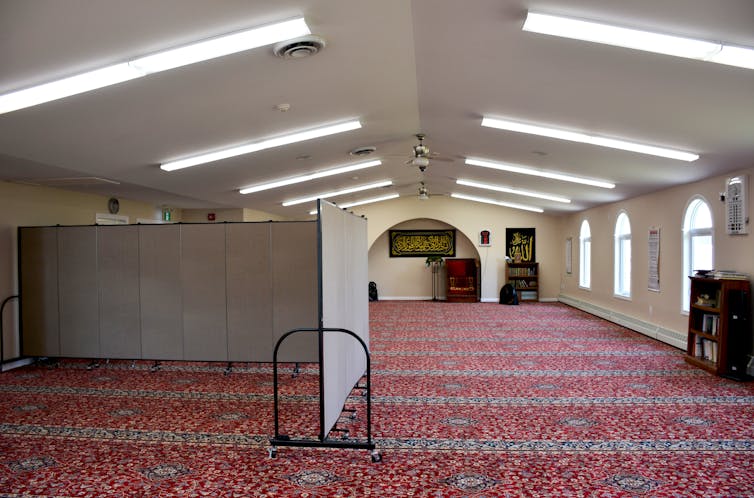
When reading the Qur'an, men and women are called to bow before God in spaces of prostration . Not once does the Qur'an prescribe an architecturally separated space for women. In secondary sources, the Hadith , scholars over the centuries interpreted the actions of the Prophet Muhammed: there are examples of the Prophet asking men to lower their gaze , to arrange mixed gender groups in a certain way or to even shorten prayers to alleviate the discomfort of mothers tending to children .
The idea suggesting it is better for women to pray at home only came along late in the 13th century, as a cultural interpretation by Muslim jurist Ibn Jawzi — not a religious order. For the first millennium of the Islamic faith, mosques were constructed without gender separation. Ample historical texts document the presence of women scholars learning and teaching in mosque spaces.
In fact, the popularization of specifically designed separate women’s spaces in mosques only began in the Ottoman era. In the 15th century, with the conquering of Constantinople (modern-day Istanbul), the 1,000-year-old Byzantine church of Hagia Sophia was converted into a mosque.
Hagia Sophia , like many other Byzantine churches, had distinctive separate spaces for women to pray in — including the balcony, or gynaeceum ; an element that was not carried over in subsequent eras of church design. Ottoman mosques post-Hagia Sophia were constructed using many Byzantine elements, including the dome most associated with mosques today. Among these elements, was also the separate balcony space of some proportion or size reserved for women.

Mosques in Canada
Over the course of my research, I’ve travelled to and examined 90 mosques in 53 cities across Canada — from Victoria to St. John’s to Inuvik and Iqaluit. I interviewed mosque patrons, board members and designers. I photographed each mosque space (exterior and interior), created architectural drawings (with my research assistants) that noted gender demarcation and learned the history of each space.
In most mosques I was welcomed wholeheartedly. In others, I was met with trepidation or doubt. Overall, my academic credentials neutralized my gender and “allowed” me access to male spaces. Meanwhile my gender allowed me entry and use of women’s spaces that are almost never discussed or analyzed in architecture texts.

Women’s spaces in Canadian mosques range from having a full view of the main prayer hall, to some view to none. In the mosques I studied , only around 15 per cent afforded women a full view of the main space, just under 40 per cent some view and the remaining 46 per cent afforded women no view at all.
Women in Canada ( and many other parts of the world ) frequently enter mosques unsure of what kind of space awaits them. Will there be reasonable room to pray? Will the space be well-lit and maintained? These questions limit inclusion and pose a serious social and architectural problem.
Architects and designers may hesitate to question a mosque design brief given to them from fear of being insensitive, but accepting a brief to design spaces that treat members of the community unequally is a problem and requires professional critique. If an architect was asked to design a gym or library where women could only access a quarter of the space with poorer quality furnishings, would the architect not question this?
Building codes regulate the baseline of expectations for spaces, however none exist regarding the gendering of sacred spaces — thus the extreme range is possible: from minuscule and poor allocation to unbarred equal space. Architects and communities, in dialogue, must understand what the impact of architectural decisions are.
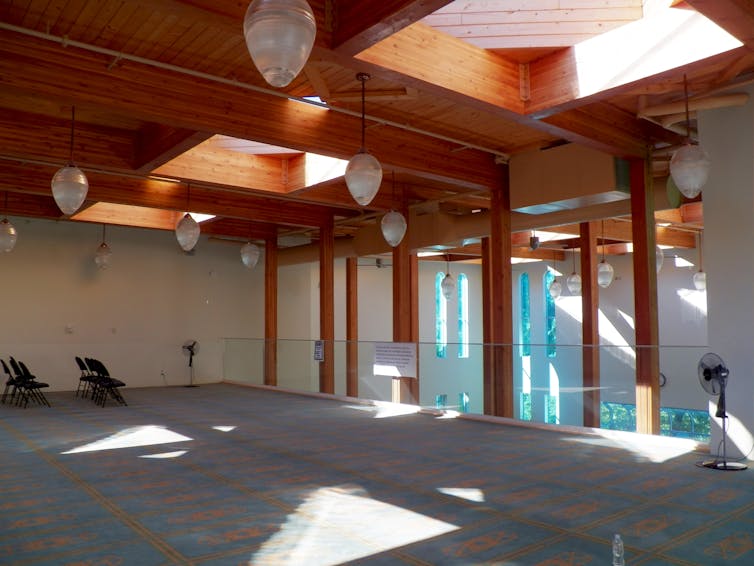
Mosques with walls, barriers and separated entrances all send a clear message to Muslim women: these spaces are not designed to include us. For mosques to remain spaces that are relevant and important to younger generations, they must adapt and learn from the historical non-gendered norms. Attendance and participation cannot be sustained under such conditions — especially by younger people who find themselves equal everywhere else but the mosque.
Mosques without gender separation have more engagement from all members of the community. These mosques function like community hubs and are active throughout the week for a wide range of community activities.
In early 2023, I was asked to join as an architecture of Islam design consultant on a large mosque and school project in Edmonton. The school and mosque will accommodate 1,500 to 2,000 people. The community has been positively engaged in the design process, with students, teachers, parents and others who will use the mosque sharing their input on the project: one designed without gender division and with consideration for a range of issues relevant to the community and area.
Instead of searching for our children on the other side of an impenetrable wall, we can start creating the kinds of mosques where all are welcome and wish to return.
- Architecture
- Ottoman Empire

Head of School, School of Arts & Social Sciences, Monash University Malaysia

Chief Operating Officer (COO)

Clinical Teaching Fellow

Data Manager

Director, Social Policy
- Mecca Tourism
- Mecca Hotels
- Bed and Breakfast Mecca
- Mecca Holiday Rentals
- Flights to Mecca
- Mecca Restaurants
- Mecca Attractions
- Mecca Travel Forum
- Mecca Photos
- All Mecca Hotels
- Mecca Hotel Deals
- Last Minute Hotels in Mecca
- Things to Do
- Restaurants
- Holiday Rentals
- Travel Stories
- Add a Place
- Travel Forum
- Travellers' Choice
- Help Centre
Can non-muslims visit Mecca? - Mecca Forum
- Middle East
- Saudi Arabia
- Makkah Province
- Mecca
Can non-muslims visit Mecca?
- United Kingdom Forums
- United States Forums
- Europe Forums
- Canada Forums
- Asia Forums
- Central America Forums
- Africa Forums
- Caribbean Forums
- Mexico Forums
- South Pacific Forums
- South America Forums
- Middle East Forums
- Honeymoons and Romance
- Business Travel
- Train Travel
- Traveling With Disabilities
- Tripadvisor Support
- Solo Travel
- Bargain Travel
- Timeshares / Holiday Rentals
- Makkah Province forums
- Mecca forum

Hello fellow travelers,
58 replies to this topic
Tripadvisor staff removed this post because it did not meet Tripadvisor's forum guideline prohibiting hate speech and racist or culturally-insensitive comments.
Tripadvisor staff has removed this post because it did not meet Tripadvisor's forum guidelines with regards to off-topic chat.

Any recent info regarding this? Planning to visit SA in mid Jan (about a month. I'm a non-muslim (chinese) tourist. If I can't go in Al Haram, I'd be happy if I could just go past and take a photo. For example from one of those hotels overlooking the site. I was thinking I could take the train over, then I just would need to get from the station over.
I dont think so its possible only goverment can allow non muslims to visit their holy places otherwise no.
Based on previous reports in this thread from a year ago, it sounded like the govt was easing restrictions (allowing some to visit). Thats why I was checking for updates

Officially you can not.
There is very little checking going on...
These were just rumors based on very scant information. I still don't believe that there would be officially opening for non-Muslims planned at nearby future.
- Umrah after Hajj 08 June 2024
- Eid ul Adha prayer in Makkah Grand mosque 07 June 2024
- Umrah alone - Single woman 03 June 2024
- Nusuk Permit check 29 May 2024
- Umrah and visa headache 28 May 2024
- Foot outlets in Makkah and Madinah 28 May 2024
- Meeqat question 27 May 2024
- Vaccination Query for Umrah Travel to Saudi on the 28th 27 May 2024
- Umrah after many yrars 27 May 2024
- Makka to Jeddah airport 27 May 2024
- Can you do either makkah ok tourist visa during hajj season 27 May 2024
- Check in luggage in stopover umrah 27 May 2024
- Umrah with kids in july after hajj 22 May 2024
- DIY umrah from UK 21 May 2024
- Umrah 2013 15 replies
- Agents for Umrah Visas only 302 replies
- Hajj 2011 - Retaj Hotel/Suite in Mecca 21 replies
- Transport - Mecca to Madinah 7 replies
- Bad hajj and umrah operators 3 replies
- Booking Makkah or Madinah hotels onlines for Umrah 6 replies
- Al-Olayan Hotel 3 replies
- hotels distance from Masjidil Haram 6 replies
- Tips for umrah 28 replies
- Umrah with small children 3 replies
Mecca Hotels and Places to Stay
- Can Non Muslims visit Makkah?
- Can we Perform Umrah on Saudi Tourist Visa?
- Albalagh.net
- AnswersToFatawa
- Arij Canada
- Askimam.org
- Askmufti.co.za
- AskOurImam.com
- CouncilofUlama.co.za
- Darulfiqh.com
- Darulifta Azaadville
- Darulifta Deoband Waqf
- Darulifta-Deoband.com
- Daruliftaa.com
- DaruliftaaMW.com
- DaruliftaaZambia.com
- DarulIftaBirmingham
- Darulihsan.com
- DarulUloomTT.net
- Fatwa-TT.com
- Fatwa.org.au
- FatwaCentre.org
- HadithAnswers.com
- IslamicPortal.co.uk
- IslamicSolutions.org
- Jamia Binoria
- Mahmoodiyah
- Mathabah.org
- Muftionline.co.za
- Muftisays.com
- MuslimaCoaching.com
- Seekersguidance.org
- ShariahBoard.org
- Tafseer Raheemi
- TheMufti.com
- ZamzamAcademy.com
- BinBayyah.net
- Darul Iftaa Jordan
- Shafiifiqh.com
- HanbaliDisciples.com
- TheHanbaliMadhhab.com
- Ask Question
- Lailatul Qadr

Home » Hanafi Fiqh » Seekersguidance.org » Why Can’t Non-Muslims Enter Makkah?
Related Q&A
- Can non-Muslims enter a mosque?
- One who Intends to Perform Hajj isn`t Allowed to Pass the Miqat without Assuming Ihram
- Can I go to Makkah for a job interview without Ihram?
- If a person is in Makkah's hadood though he has already performed many umrah's and hajj-(1) whether Umrah is Fardh upon him or not?
- Visiting Madinah Munawwarah First When on Hajj Tamattu
- Can non-Muslims enter Mecca and was Jawahar Lal Nehru allowed entry?
Why Can’t Non-Muslims Enter Makkah?
Answered by Shaykh Abdullah Anik Misra
For two years after conquering Makkah, the Prophet (Allah bless him and give him peace) left the door of the Haram Mosque open for non-Muslims to perform Hajj and Umrah. It is not reported that he ever prevented them from drinking Zam Zam water. Currently, the Saudi Arabian government does not allow non-Muslims to enter; doesn’t this go against the teachings of The Prophet (Allah bless him and give him peace)?
In the Name of Allah, Most Merciful and Compassionate
I cannot speak on why the modern-day government of Saudi Arabia chooses to make the decisions it does concerning the Al-Haram al-Sharif on this issue; it could be a mix of taking a particular religious opinion and logistical or practical reasons.
However, regarding the legal rulings, there is a difference of opinion that has been addressed in the two answers below:
Are non-Muslims Allowed to Enter Mecca and the Sacred Mosque (Haram)? – SeekersGuidance Permissibility of Non-Muslims Entering Mecca – SeekersGuidance
[Shaykh] Abdullah Anik Misra Checked and Approved by Shaykh Abdul-Rahim Reasat
Shaykh Abdullah Anik Misra was born in Toronto, Canada, in 1983. His family hails from India, and he was raised in the Hindu tradition. He embraced Islam in 2001 while at the University of Toronto, from where he completed a Bachelor of Business Administration. He then traveled overseas in 2005 to study the Arabic language and Islamic sciences in Tarim, Yemen, for some time, as well as Darul Uloom in Trinidad, West Indies. He spent 12 years in Amman, Jordan, where he focused on Islamic Law, Theology, Hadith Sciences, Prophetic Biography, and Islamic Spirituality while also working at the Qasid Arabic Institute as Director of Programs. He holds a BA in Islamic Studies (Alimiyya, Darul Uloom) and authorization in the six authentic books of Hadith and is currently pursuing specialized training in issuing Islamic legal verdicts (ifta’). He holds a certificate in Counselling and often works with new Muslims and those struggling with religious OCD. He is an instructor and researcher in Sacred Law and Theology with the SeekersGuidance The Global Islamic Seminary. Currently, He resides in the Greater Toronto Area with his wife and children. His personal interests include Indian history, comparative religion, English singing, and poetry.
This answer was collected from Seekersguidance.org. It’s an online learning platform overseen by Sheikh Faraz Rabbani. All courses are free. They also have in-person classes in Canada.
Read answers with similar topics:
Random Q&A
Does the revocation of a divorce cancel a divorce , promised wife not to have a second marriage, praying witr sitting, online forex, my wife annoys me a lot, but she is righteous… what do i do , if a muslim feels sad about sins they made in the past, more answers….
- Can I Start Memorizing A Surah of the Qur’an From its Middle?
- Question: What are the principles to be used when getting a home loan that is in accordance to the Shariah from the various Islamic Banks?
- Is a Lack Of Forgiveness Considered a Sin?
- I Need to Get Things off My Chest. Can I Confide in My Husband or Is That Gossiping?
- Women Covering Feet
- Scholars, Students of Sacred Knowledge and Poverty
Latest Q&A
- Is Makeup Allowed During Iḥrām?
- Do These Actions Formulate Disbelief?
- The Status of a Job Acquired with False Certification
- Can a Ḥanafī Resident Pray Behind a Shāfi’īe Traveller?
- Is it Permissible to Allow Wheelchairs in a Masjid?
- Is an Entry Fee at a Charity Event Considered Charity?
Indexed Websites
Privacy overview.

This copy is for your personal, non-commercial use only. To order presentation-ready copies for distribution to your colleagues, clients or customers visit http://www.djreprints.com.
https://www.barrons.com/news/saudi-clears-mecca-of-over-300-000-unregistered-pilgrims-ahead-of-hajj-da630472
- FROM AFP NEWS
Saudi Clears Mecca Of Over 300,000 Unregistered Pilgrims Ahead Of Hajj
- Order Reprints
- Print Article
Saudi Arabia said on Saturday that security forces had cleared hundreds of thousands of unregistered pilgrims from Mecca ahead of the hajj which begins next week.
Crowd management is a major concern during the annual pilgrimage, one of the five pillars of Islam which drew more than 1.8 million Muslims last year, according to official figures.
Those turned away in recent days from the holy city, home to the Grand Mosque, include 153,998 foreigners who travelled from abroad on tourist visas rather than the required hajj visas, the official Saudi Press Agency said.
In addition Saudi authorities have rounded up 171,587 others who are based in Saudi Arabia but are not residents of Mecca and did not have hajj permits, SPA said.
The hajj, which begins on June 14, must be undertaken at least once by all Muslims with the means.
It involves a series of rituals completed over at least four days in Mecca and its surroundings in the west of Saudi Arabia.
Many seek to complete the rites through unofficial channels as obtaining the formal permits and travel packages can be extremely costly, with limited quotas for pilgrims from each country.
Saudi Arabia is home to the holiest shrines in Islam at Mecca and Medina, and the Gulf kingdom makes billions of dollars each year from the hajj and from pilgrimages, known as umrah, undertaken at other times of the year.
The pilgrimages are also a source of prestige for the Saudi monarch whose official title includes "Custodian of the Two Holy Mosques" in Mecca and Medina.
Large crowds have proved hazardous in the past during the hajj, most recently in 2015 when a stampede during the "stoning the devil" ritual in Mina, near Mecca, killed up to 2,300 people in the deadliest-ever hajj disaster.
Fears of a repeat have spurred Saudi officials to crack down on off-the-books pilgrims.
More than 1.3 million registered pilgrims had arrived in Saudi Arabia for the hajj as of Saturday, Mecca regional authorities said on X.
An error has occurred, please try again later.
This article has been sent to
- Cryptocurrencies
- Stock Picks
- Barron's Live
- Barron's Stock Screen
- Personal Finance
- Advisor Directory
Memberships
- Subscribe to Barron's
- Saved Articles
- Newsletters
- Video Center
Customer Service
- Customer Center
- The Wall Street Journal
- MarketWatch
- Investor's Business Daily
- Mansion Global
- Financial News London
For Business
- Corporate Subscriptions
For Education
- Investing in Education
For Advertisers
- Press & Media Inquiries
- Advertising
- Subscriber Benefits
- Manage Notifications
- Manage Alerts
About Barron's
- Live Events
Copyright ©2024 Dow Jones & Company, Inc. All Rights Reserved
This copy is for your personal, non-commercial use only. Distribution and use of this material are governed by our Subscriber Agreement and by copyright law. For non-personal use or to order multiple copies, please contact Dow Jones Reprints at 1-800-843-0008 or visit www.djreprints.com.

COMMENTS
When the question arises, ' Can non-Muslims go to Mecca ' the answer is No. Non-Muslims are not allowed to enter the holy cities of Mecca in Saudi Arabia. The reasons for this restriction are deeply rooted in the Islamic faith and history. Mecca and Medina are considered the holiest cities in Islam and are revered by Muslims worldwide.
Mecca is not a destination for tourists, less so for non-muslim tourists. A lot of the discussions connected to this question deal with the traveler in question not being muslim, but visiting a 'Muslims only' area, specifically Mecca. If you break the law in any country, you might face the consequences.
Yes, most mosques in the world are open to non-Muslims. Non-Muslims cannot enter the city of Mecca. However, non-Muslims can enter the city of Medinah, located north of Saudi Arabia. They are only restricted from entering the Prophet's mosque, where the prophet Mohammaed is buried. Non-Muslims also may be restricted from entering mosques ...
Question: Can a non-Muslim visit Mecca? In the name of Allah, the Most Gracious, the Most Merciful. Answer: Imam an-Nasafi explains that the view of the Hanafi jurists is that non-Muslims are not allowed to perform hajj and umrah, however, it is allowed for them to enter Makkah Mukarramah and the Masjid al-Haram. 1. Only Allah knows best.
This prohibition hit the news when Gil Tamary, an American Jew and TV journalist in Israel, illicitly slipped into Mecca to record material and broadcast a much-hyped 10-minute travelogue. Muslims have enforced the ban so carefully, Pipes reports, that only 18 non-Muslims are known to have ever entered Mecca, including Tamary and two others in ...
Mecca is a city of terrific importance in Islamic tradition. It is a center of pilgrimage and prayer -- a sacred place where Muslims are free from the distractions of daily life. Only Muslims are allowed to visit the holy city of Mecca and enter its inner sanctum, the birthplace of the Prophet Muhammad and Islam.
Can I travel to Mecca as a tourist? The simple answer is no, unless you're Muslim. Non-Muslims are strictly prohibited from entering the holy city of Mecca and certain parts of Medina. Signs indicating these boundaries are clearly signposted, and it's crucial to respect these restrictions. Rules and restrictions for visiting Mecca as a Muslim ...
The hajj takes place only once a year, in the 12th and final month of the Islamic lunar calendar; pilgrimages to Mecca made at other times in the year are encouraged but do not count as the hajj.
Abu Hanifa's opinion was that non-Muslims can enter Mecca and even the Sacred Mosque [haram], as long as they do not do so for the sake of the pilgrimage [hajj or umra], which they are not allowed to perform. This is the opinion of the Hanafi school of law, which historically up to today has been the largest juridical school of Islam.
Can I visit Mecca as a Tourist? Mecca is the holiest city in Islam and Saudi law strictly forbids non-Muslims from entering it. Documents will be checked upon entry at dedicated checkpoints, and non-Muslims will be redirected to a motorway that bypasses the city. Pilgrims must show proof of being Muslim (a certificate is needed for those ...
In the Hanafi school, it is permitted for non-Muslims to enter all mosques, including the Haram of Mecca. The Qur'anic verse, "O you who believe! The idolaters only are unclean. So let them not come near the Inviolable Place of Worship after this their year," [Qur'an 09:28] was interpreted by the Hanafi jurists to be a specific ...
There is no religious reason to limit the entry to Mecca to only Muslims. However, due to the sheer number of people who visit the city for Hajj or Umrah every year, the Saudi authorities limited access to the city.
As a Non-Muslim, I was not able to enter Mecca but there is one interesting museum (the Vertical museum) which is located on the outskirts of the city (just outside the restricted zone) which is open to Non-Muslims. It's a fascinating museum which houses an amazing collection of relics from the Kaaba. As a Non-Muslim, it was ironic that, while ...
And several Non-Muslims have reportedly visited Mecca recently, and have been told by the authorities there that they are allowed to visit. It is clear that Non-Muslims cannot enter the mosques in either city. If this is the current policy, that Non-Muslims can go to Medina and Mecca, but not enter the mosques, that seems like a logical policy ...
Ok, let me explain because questions like this are a lot. For non-Muslims, it's not allowed both religiously and legally to enter Mecca or Madinah and the areas around them. In the past, like maybe 100 years ago, it was a bit easier for non-Muslims to sneak into Mecca but in the modern time because of all the advancements in this issue, it's almost impossible to enter.
Non-Muslims are forbidden to travel to Mecca and the portions of Medina which are considered sacred. All pilgrims visiting for Hajj must leave Saudi Arabia after the completion of Hajj. ALL / ALL / Women Pilgrims Women can register for Hajj without a male guardian if they go in a group with other women. ALL / ...
There are reports of non-Muslim tourists visiting Mecca but the Haraam rules for Mecca state clearly that you can't enter Haraam area if you are not a Muslim. Don't expect any mention of certain written laws nor anything else from Saudi tourist office, visa support or something like this :) This is the way things work here.
THE QUESTION: Why does Islam ban non-Muslims from the holy cities of Mecca and Medina? THE RELIGION GUY'S ANSWER: Daniel Pipes of the Middle East Forum is among the last people Saudi Arabians might want to listen to. Yet he penned a Wall Street Journal op-ed last month urging Crown Prince Mohammed bin Salman to end Islam's long-standing ban against non-Muslims entering the faith's two ...
In Mecca, only Muslims are allowed, while non-Muslims may not enter or pass through. Attempting to enter Mecca as a non-Muslim can result in penalties such as a fine; being in Mecca as a non-Muslim can result in deportation. In Medina, non-Muslims are not allowed to enter Nabawi Square, where the Al-Masjid Al-Nabawi is located.
Therefore, we can't just have non-Muslims entering and leaving as they please, treating the Holy City as some tourist destination. As for how belief is checked, I'm pretty sure the guards just look at the person's name. For example if someone's name is Musa or something, the guards will let him go.
Can I visit Mecca as a Tourist? Mecca is the holiest city in Islam and Saudi law strictly forbids non-Muslims from entering it. Documents will be checked upon entry at dedicated checkpoints, and non-Muslims will be redirected to a motorway that bypasses the city. Pilgrims must show proof of being Muslim (a certificate is needed for those ...
In Mecca, during my pilgrimage, I prayed and performed the rituals as Muslims have for over 1,400 years, without gender divisions. That disconnect between the historical and modern was real and ...
Any recent info regarding this? Planning to visit SA in mid Jan (about a month. I'm a non-muslim (chinese) tourist. If I can't go in Al Haram, I'd be happy if I could just go past and take a photo. For example from one of those hotels overlooking the site. I was thinking I could take the train over, then I just would need to get from the ...
Are non-Muslims Allowed to Enter Mecca and the Sacred Mosque (Haram)? - SeekersGuidance Permissibility of Non-Muslims Entering Mecca - SeekersGuidance. Wassalam, [Shaykh] Abdullah Anik Misra Checked and Approved by Shaykh Abdul-Rahim Reasat. Shaykh Abdullah Anik Misra was born in Toronto, Canada, in 1983. His family hails from India, and he ...
Text size. Saudi Arabia said on Saturday that security forces had cleared hundreds of thousands of unregistered pilgrims from Mecca ahead of the hajj which begins next week. Crowd management is a ...